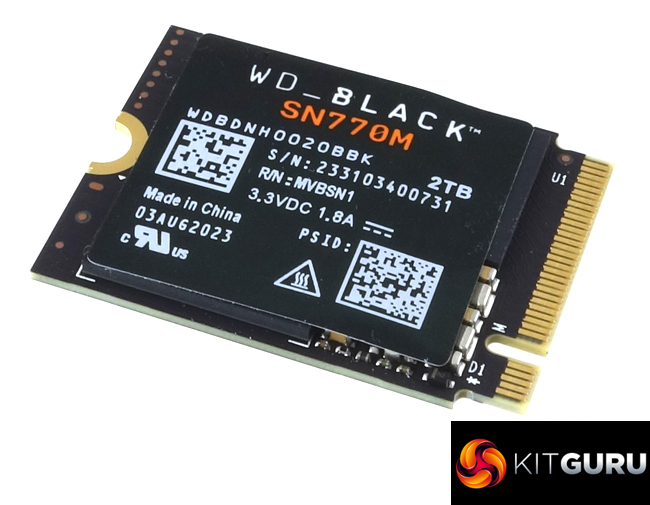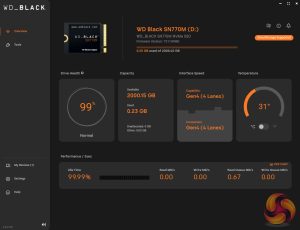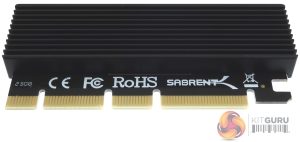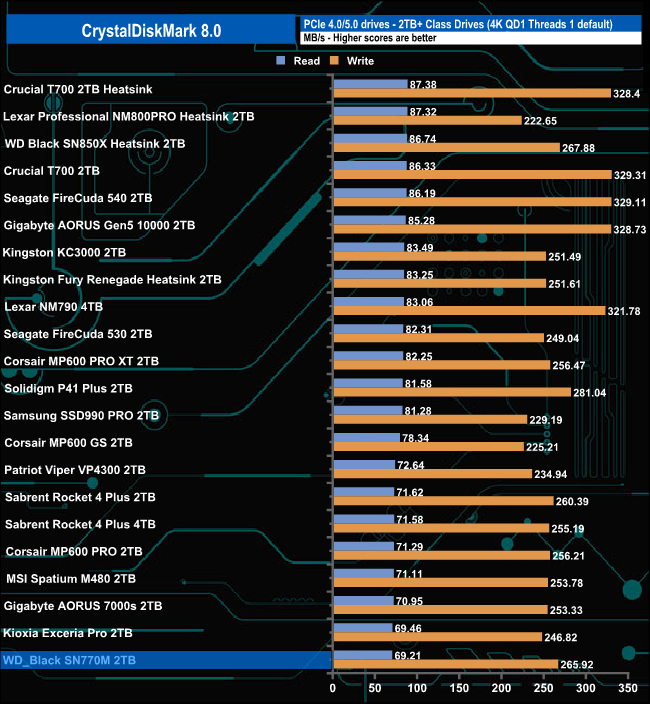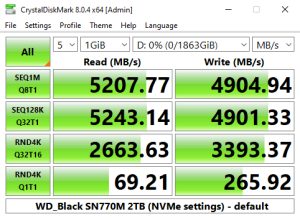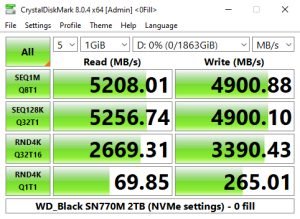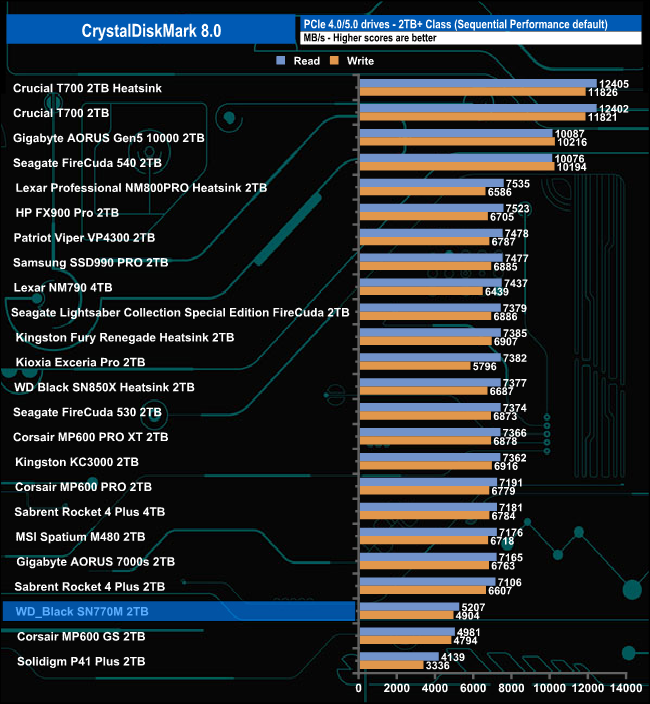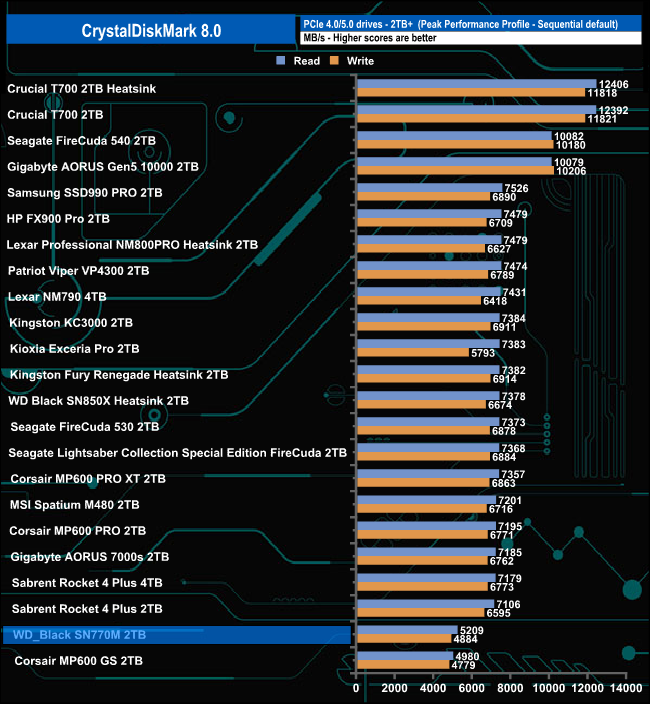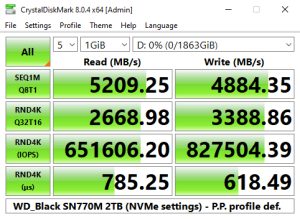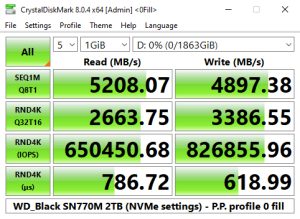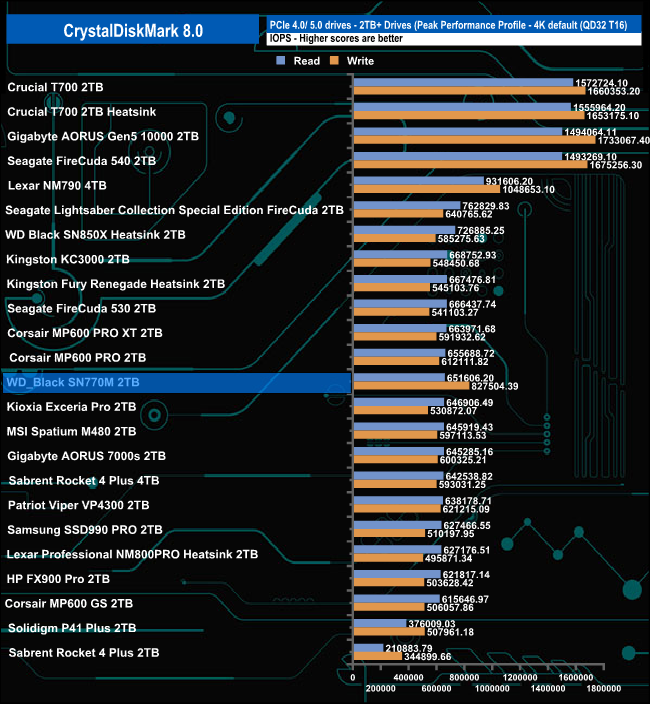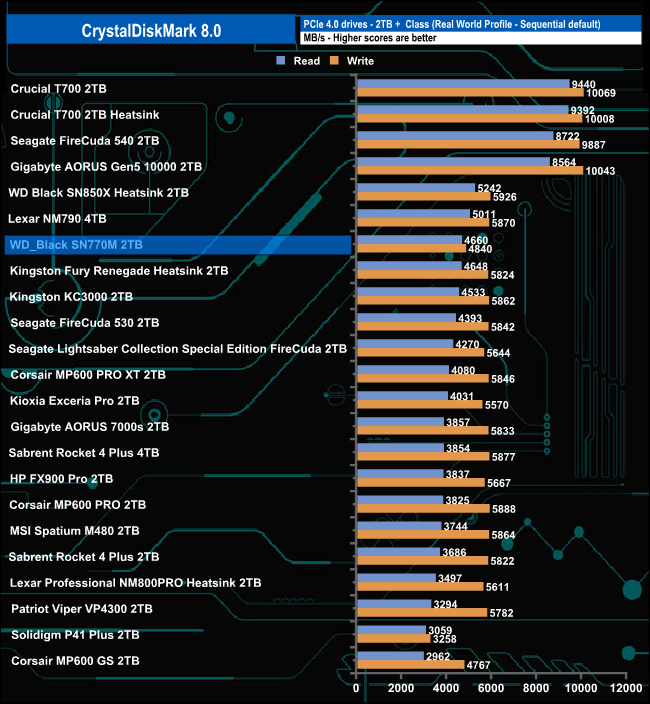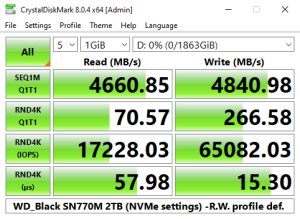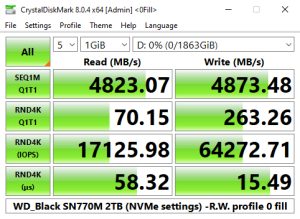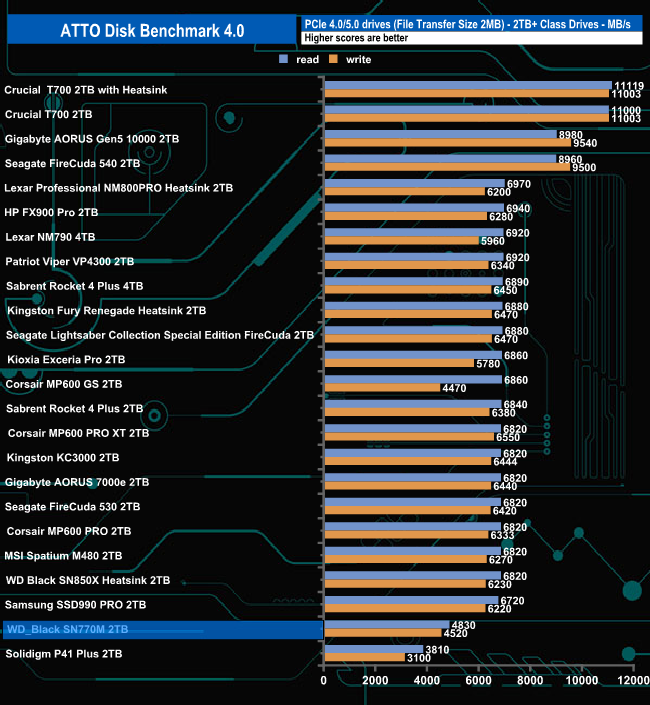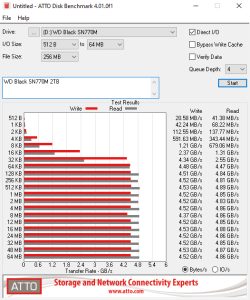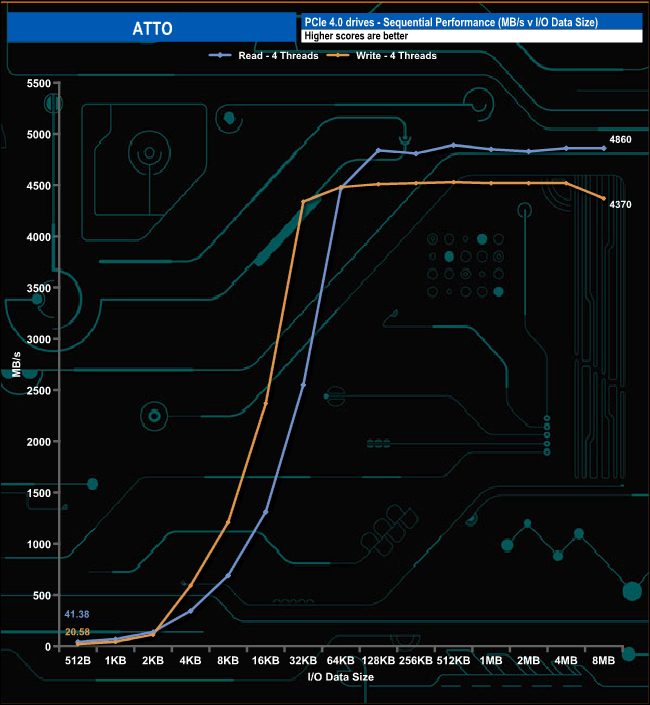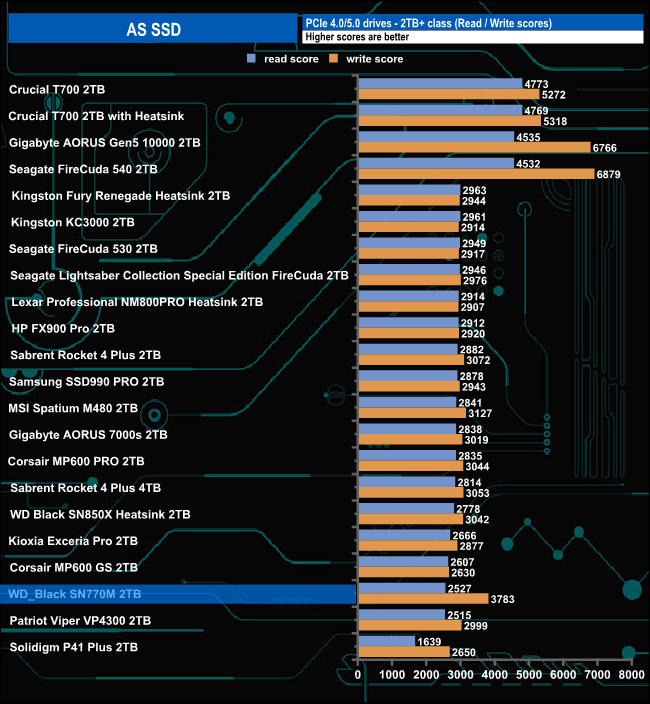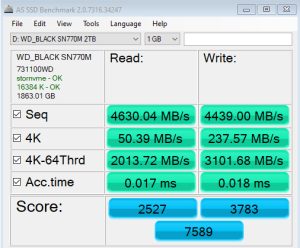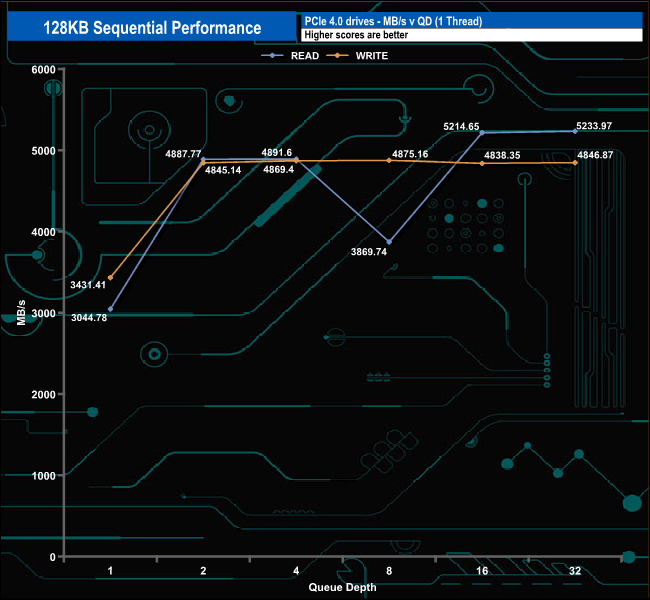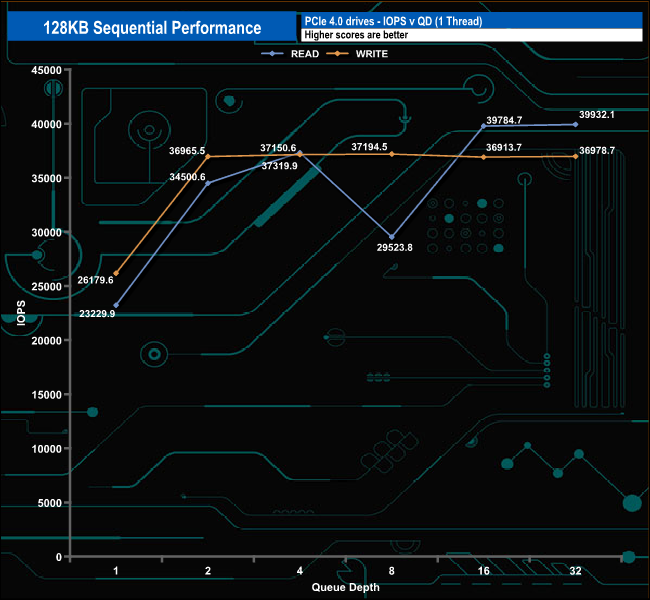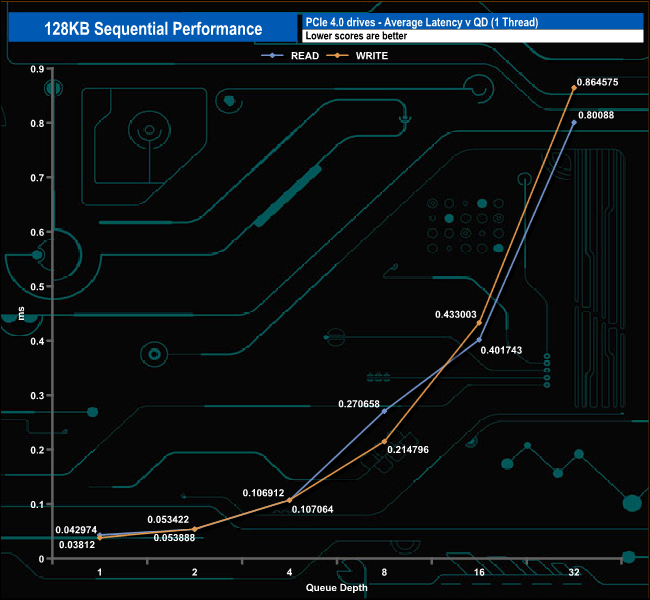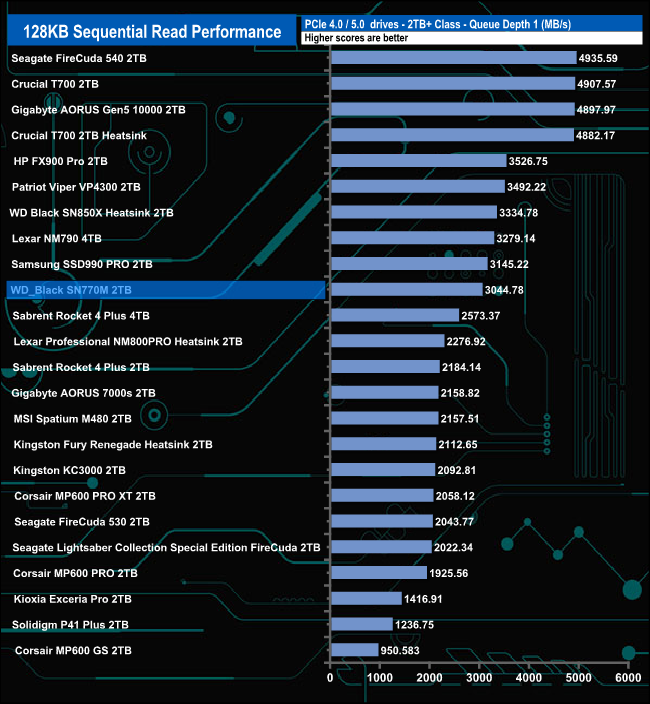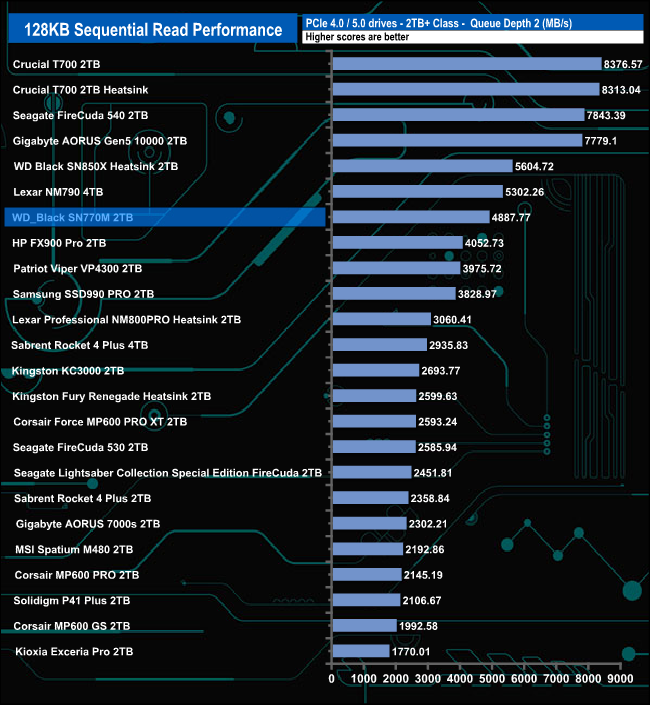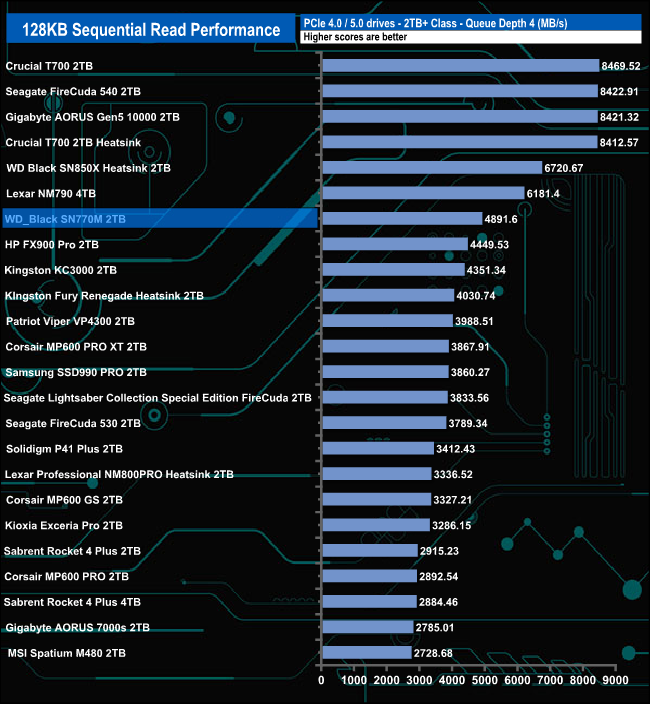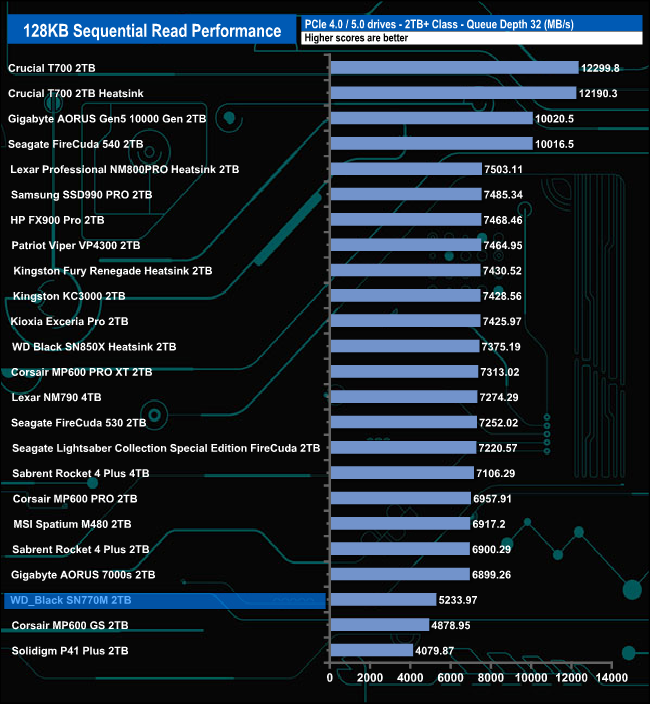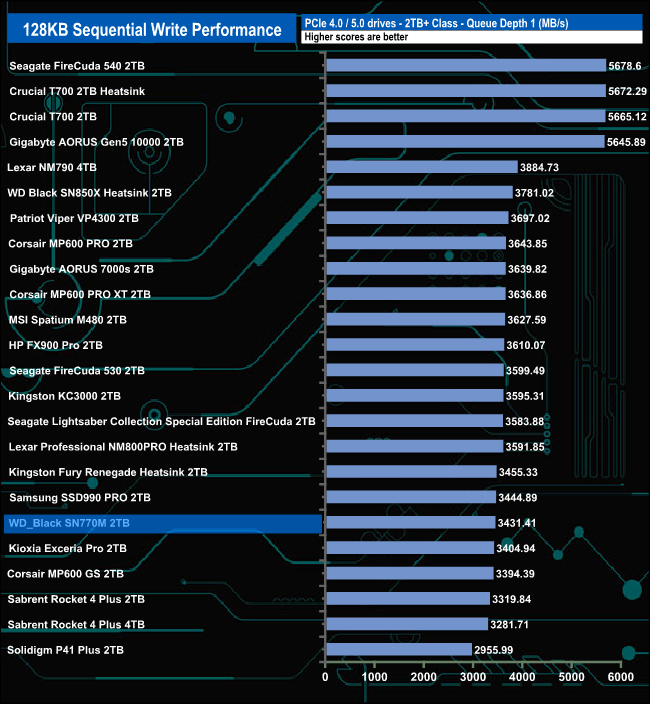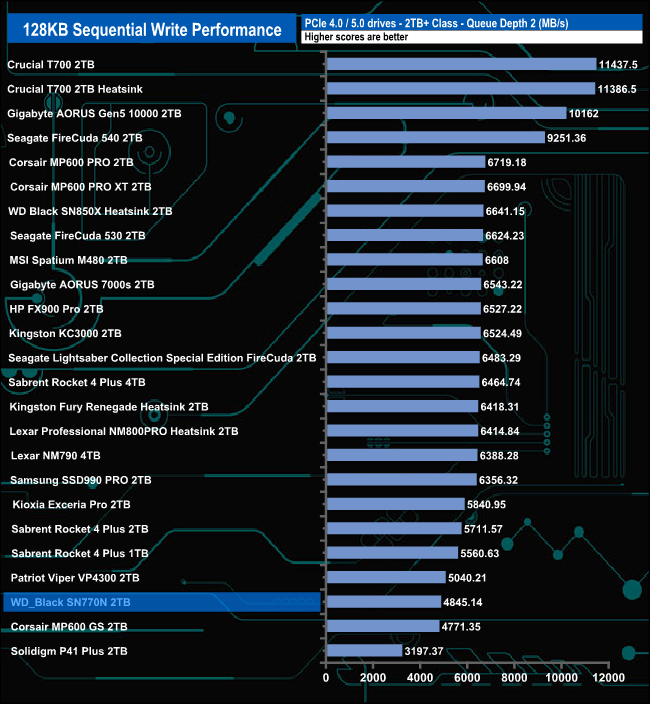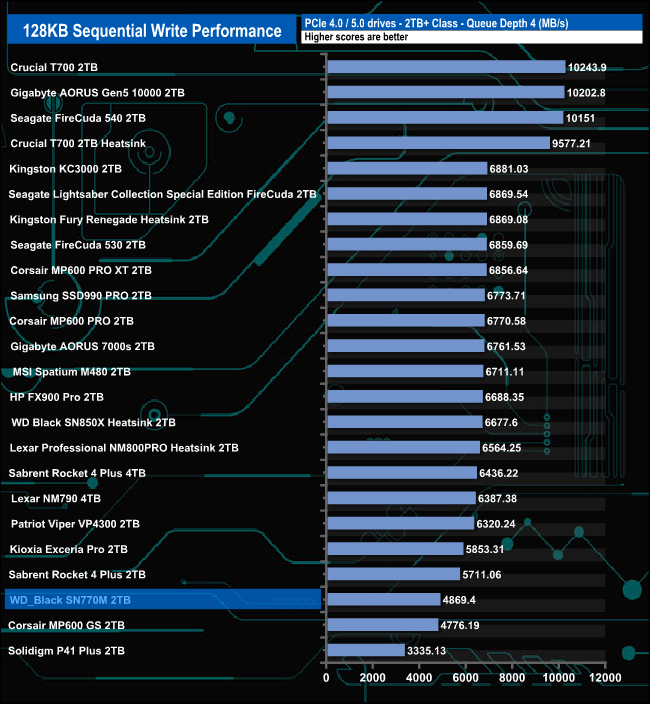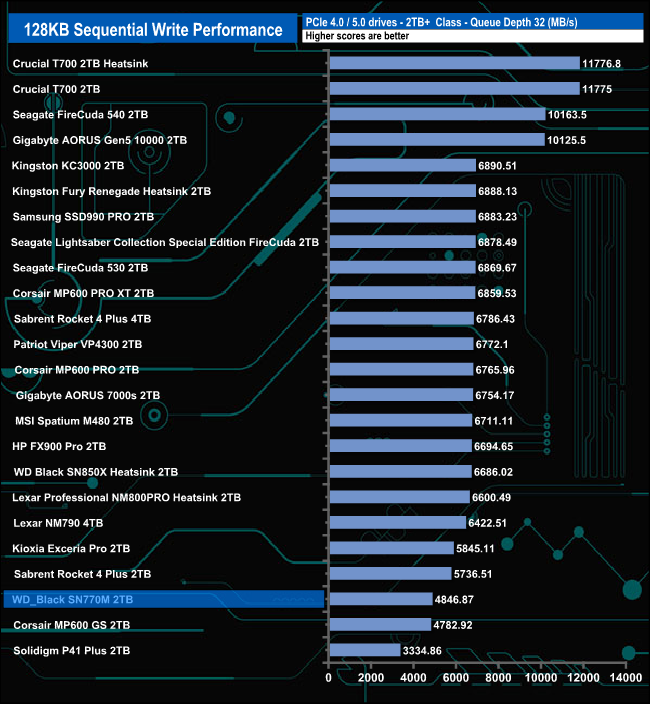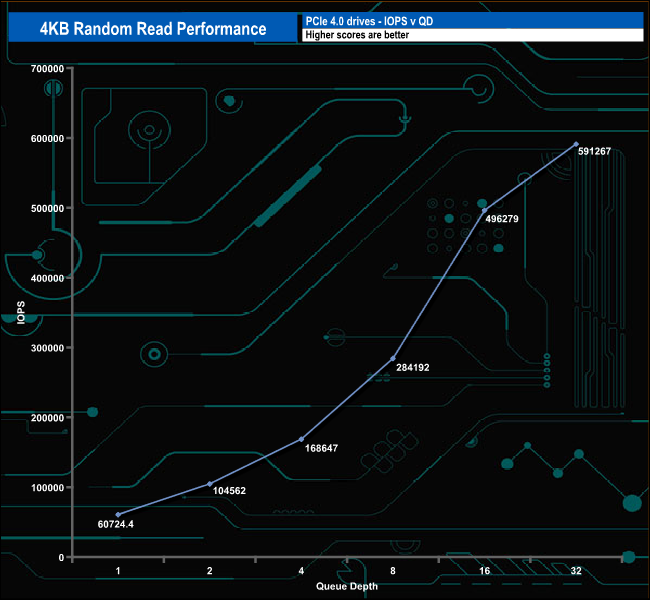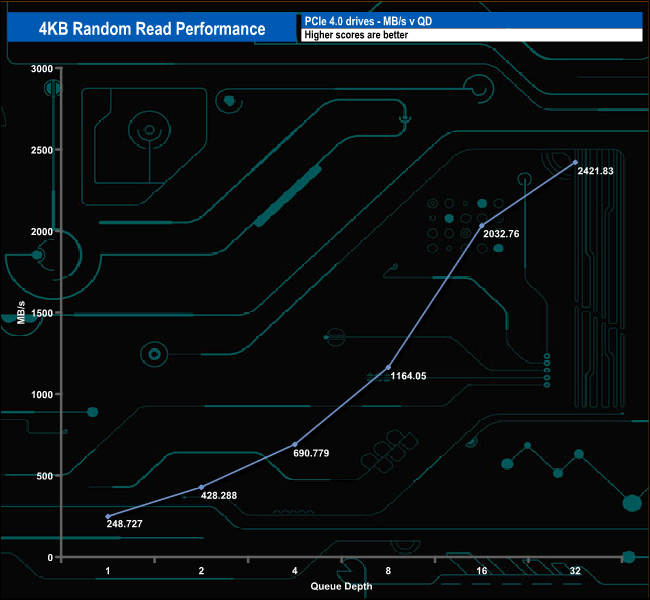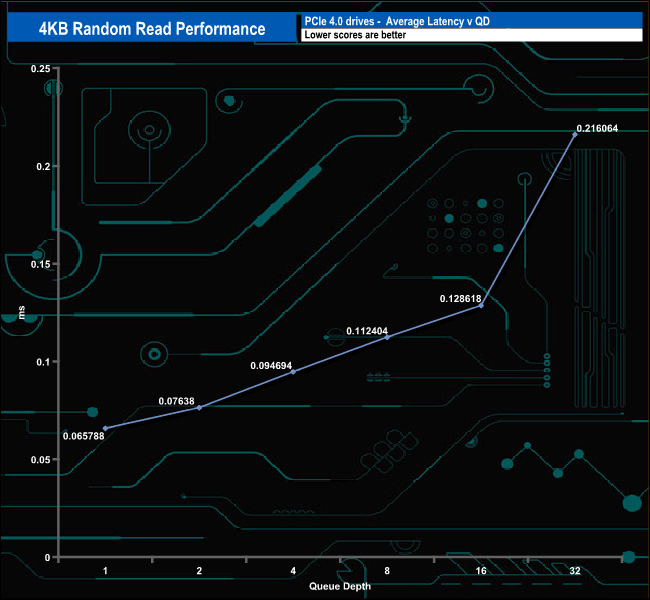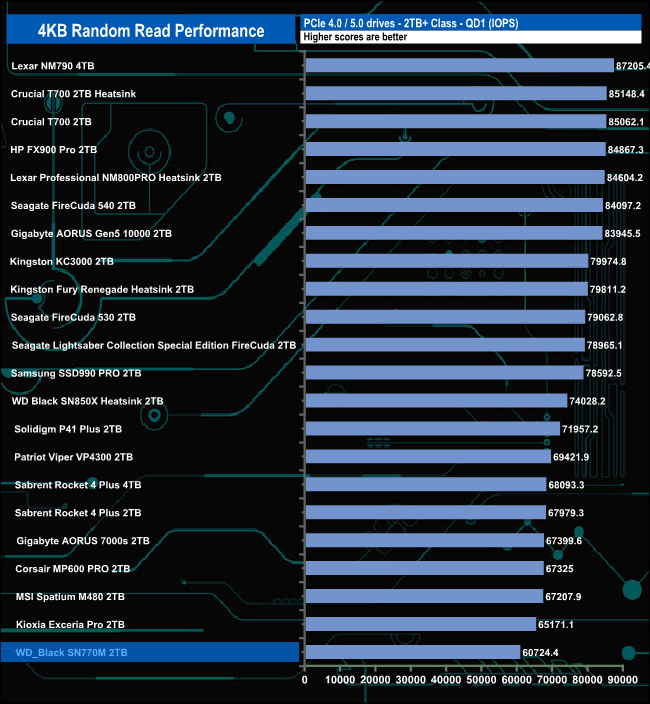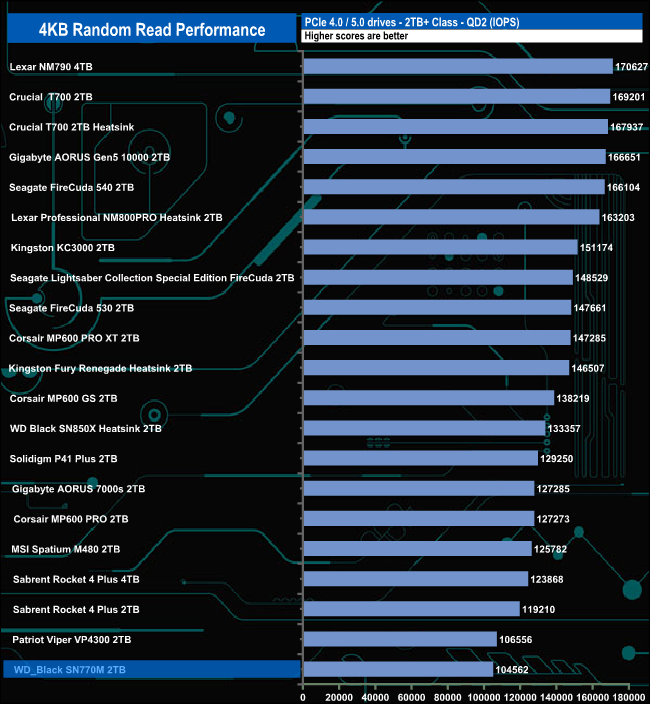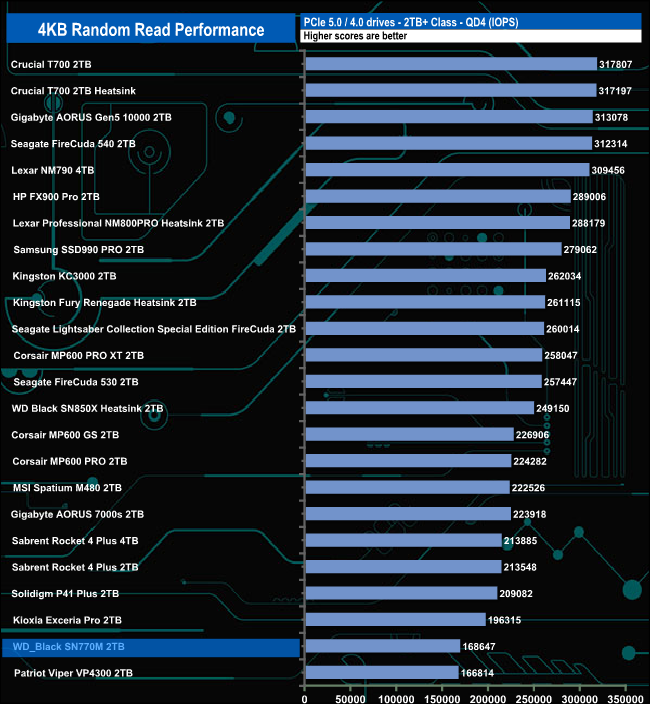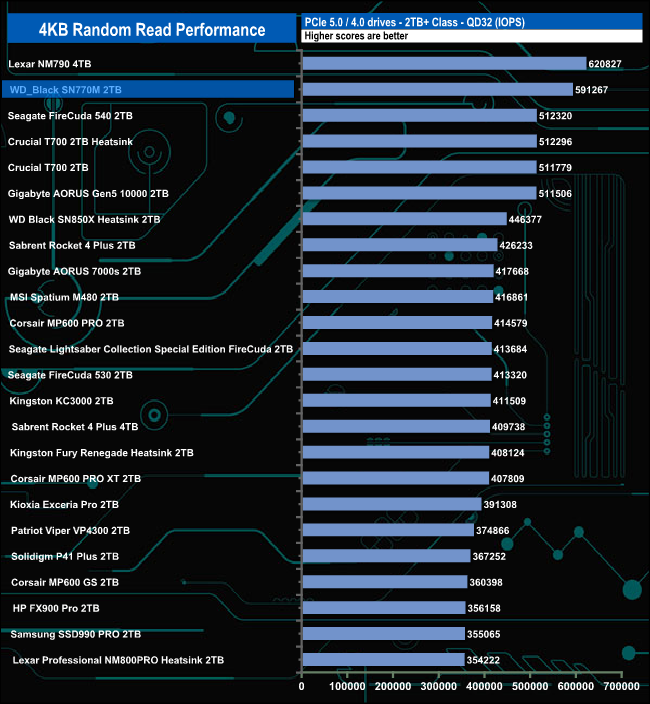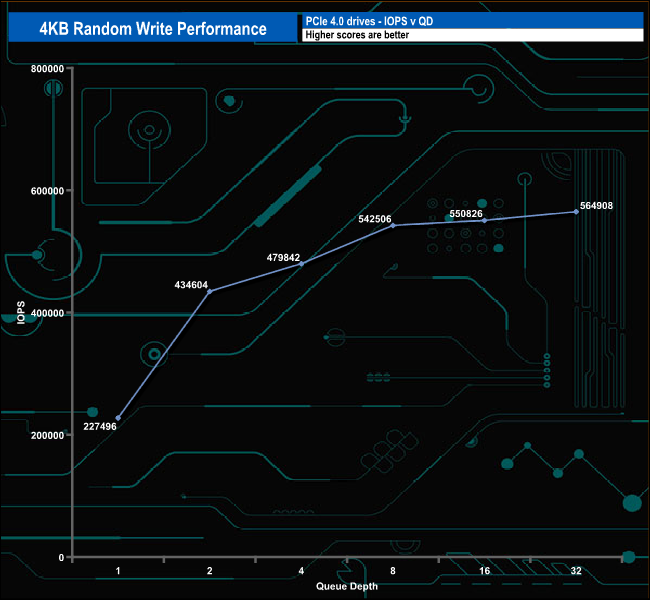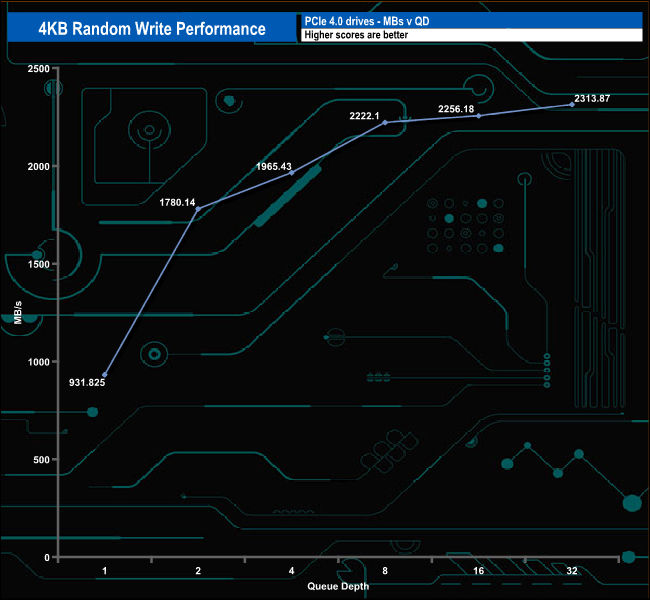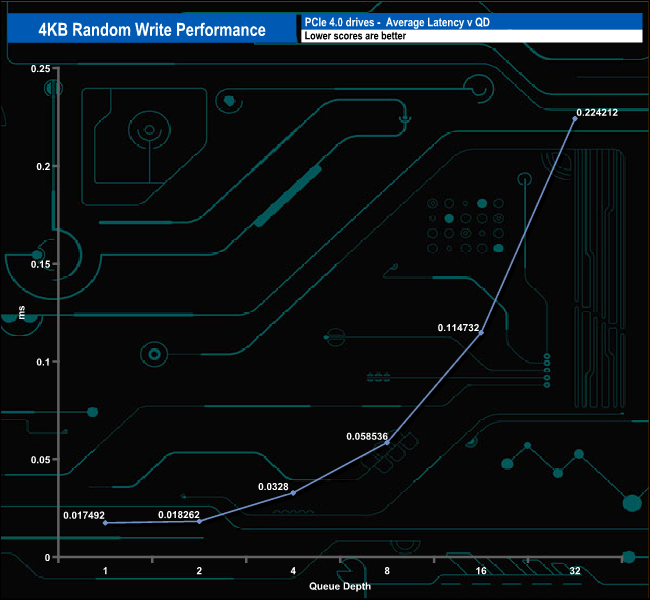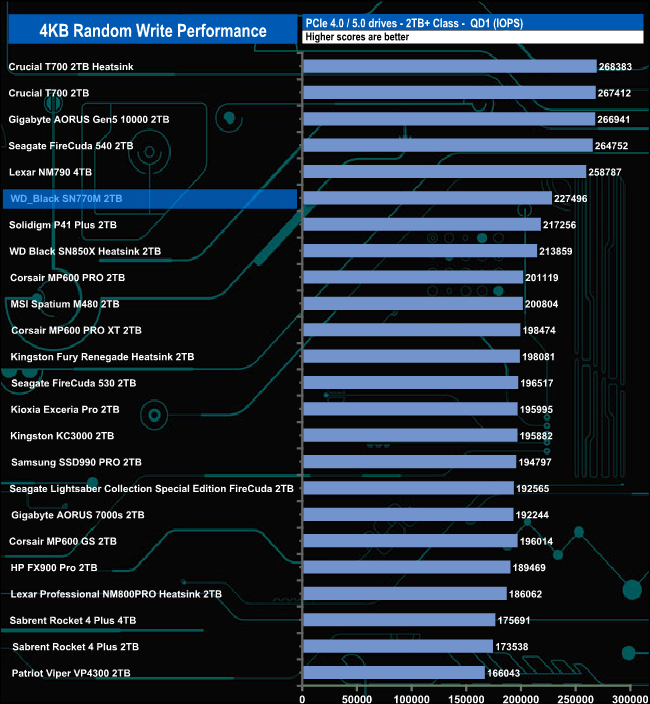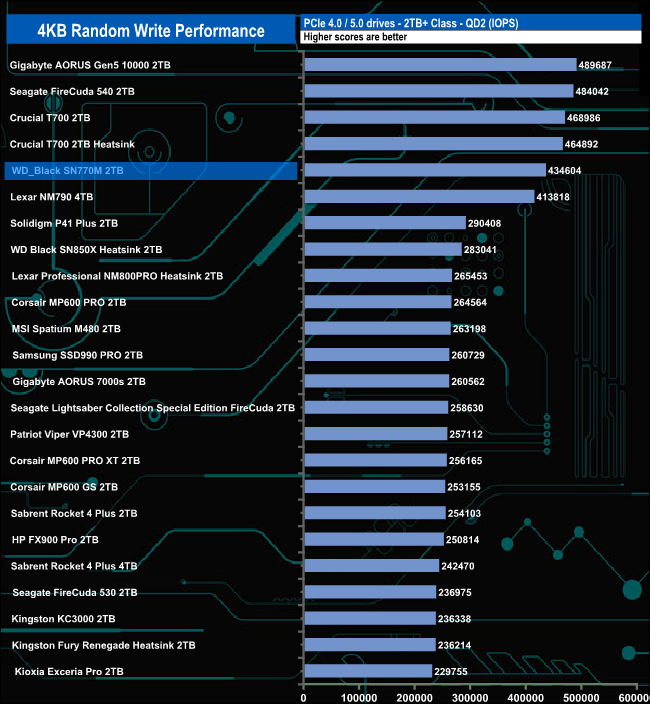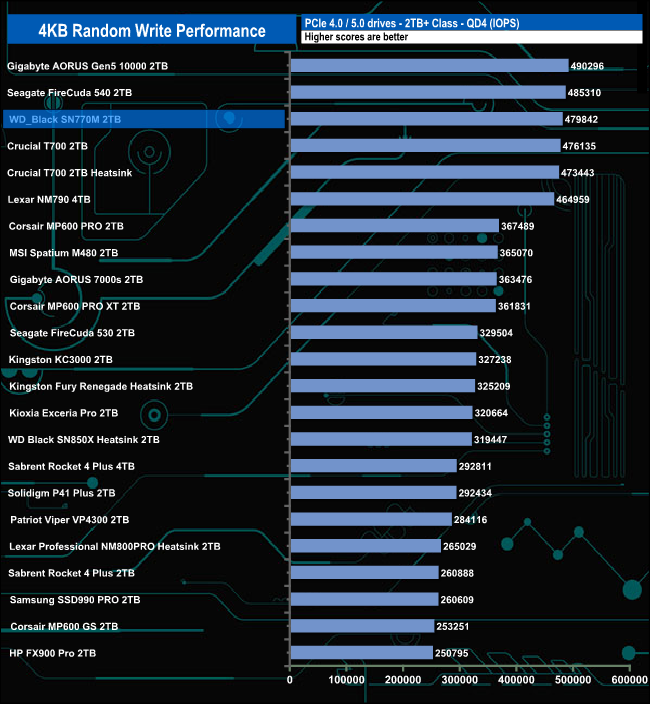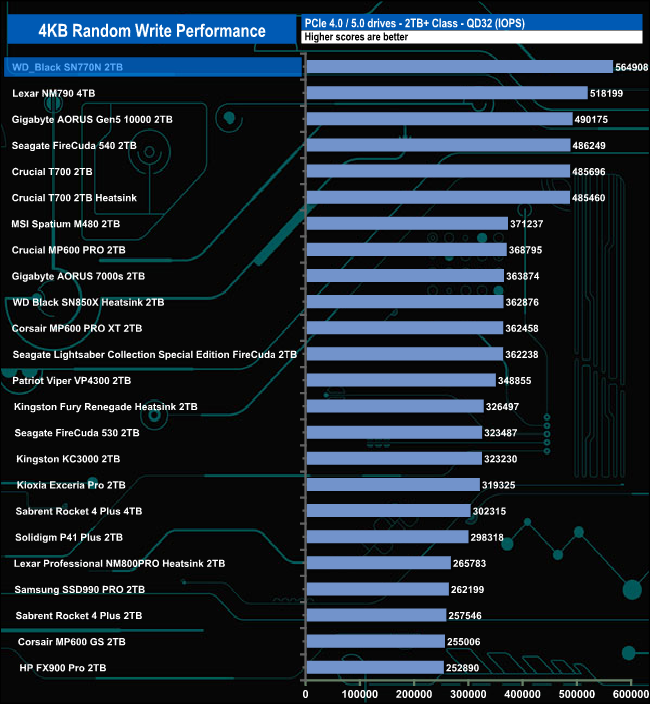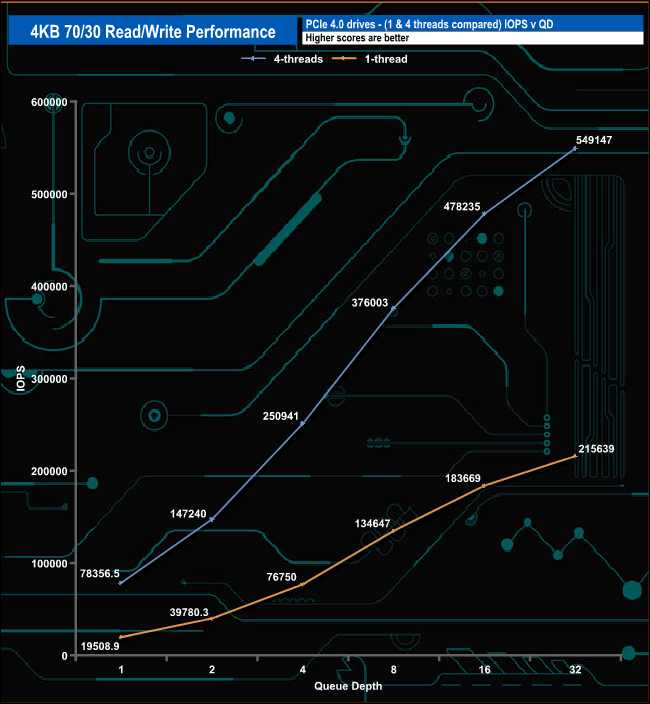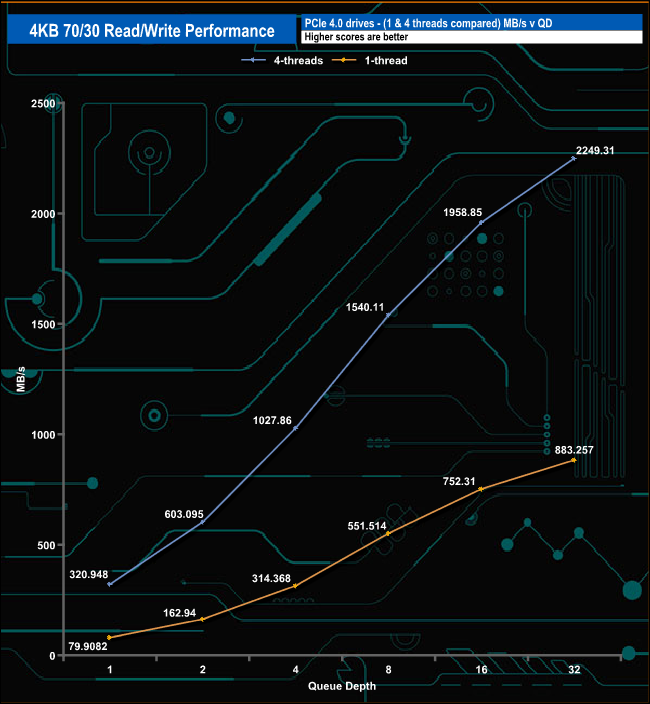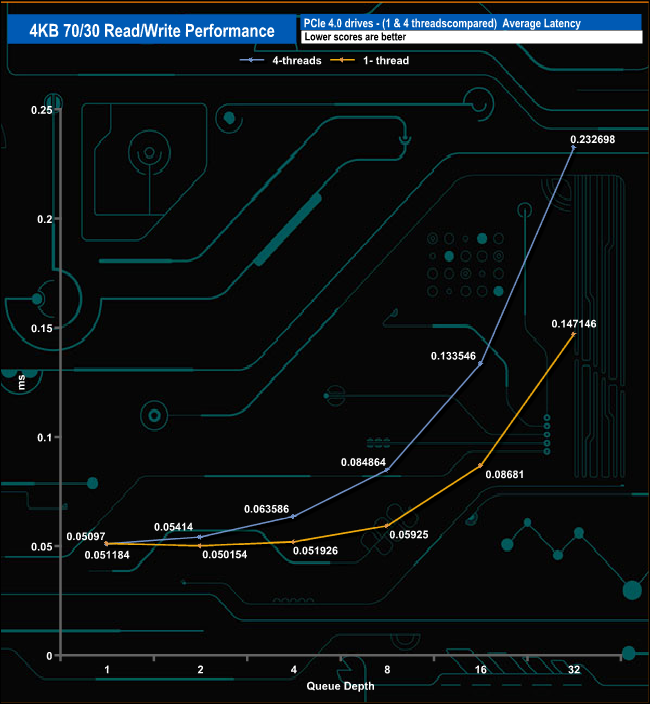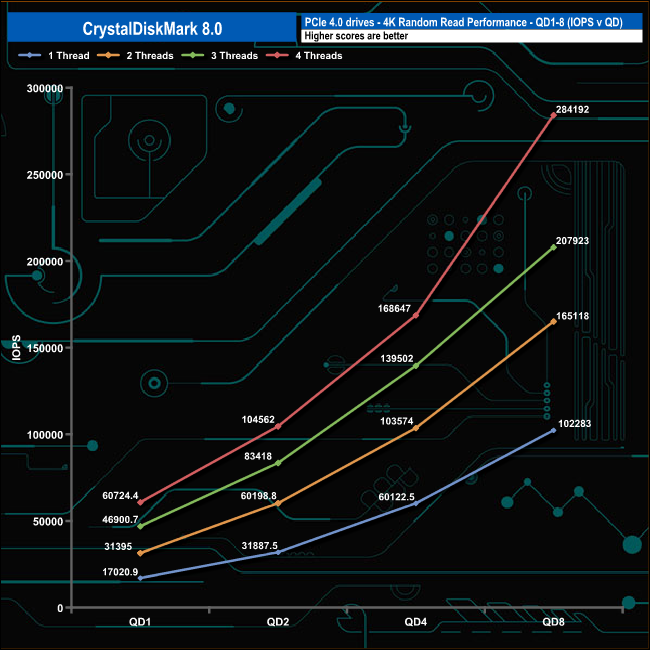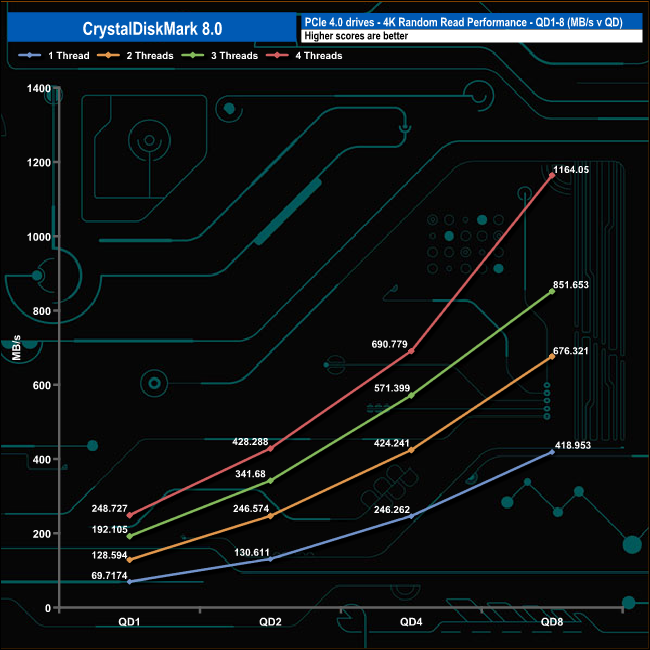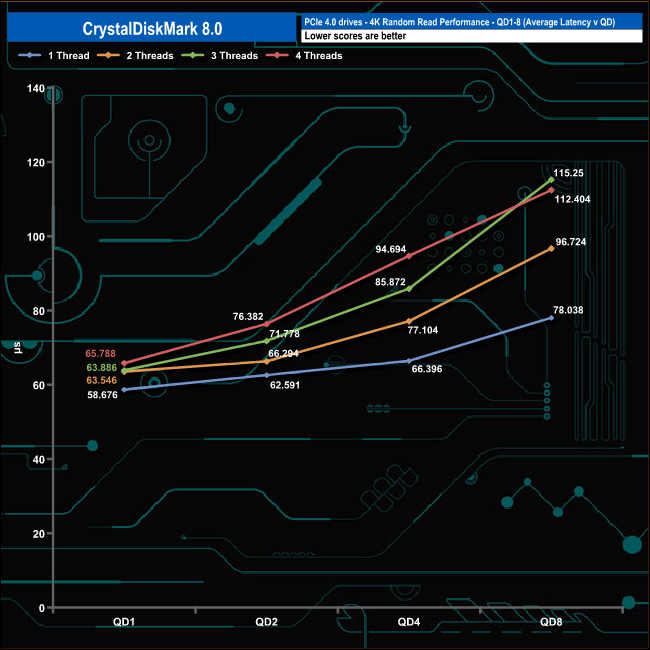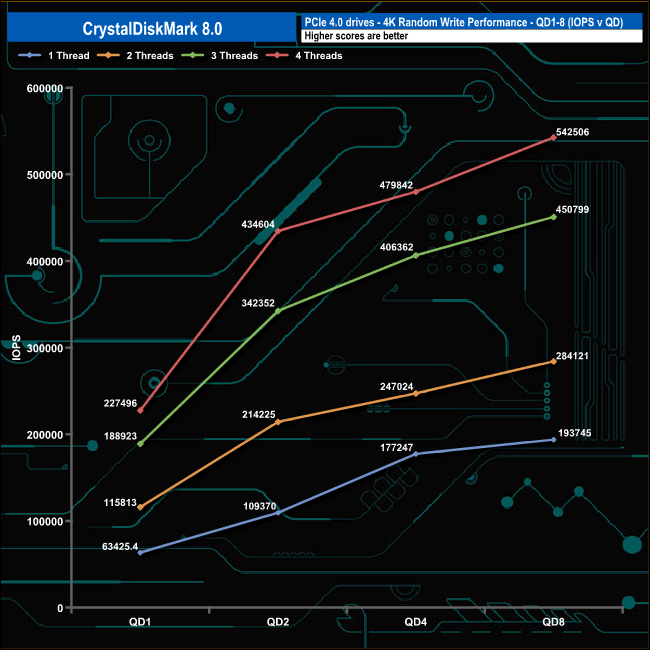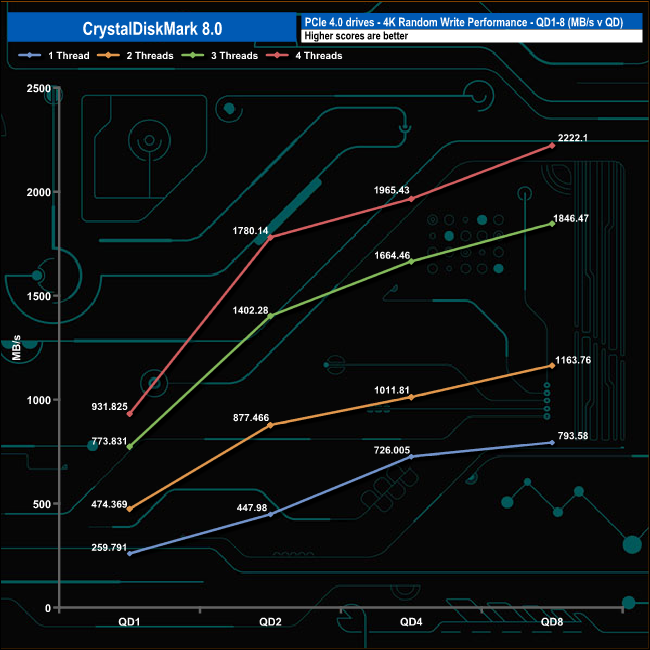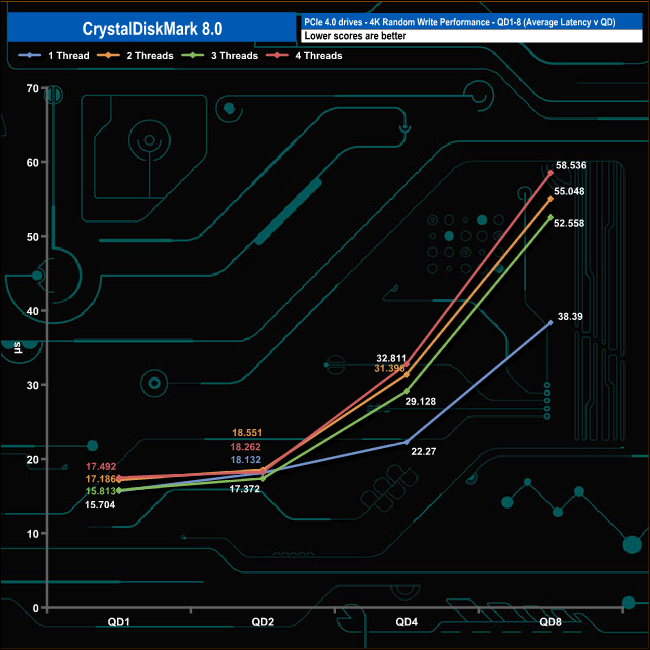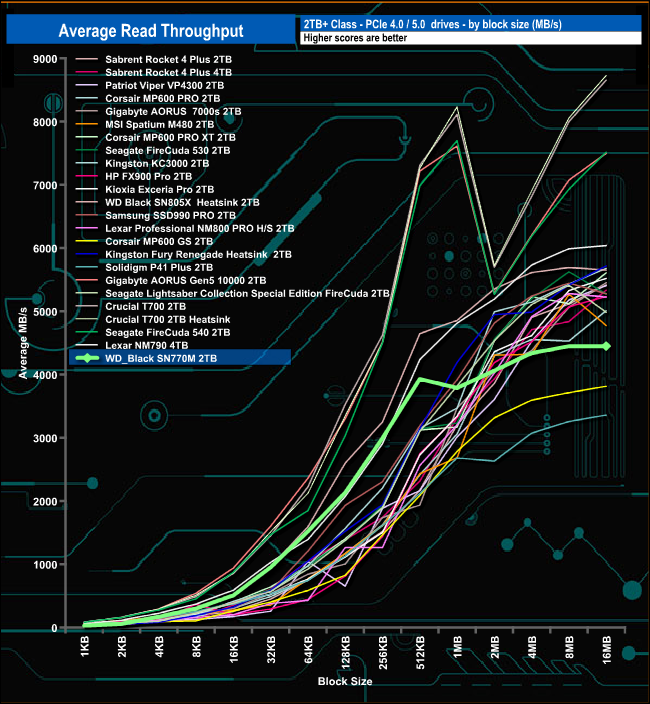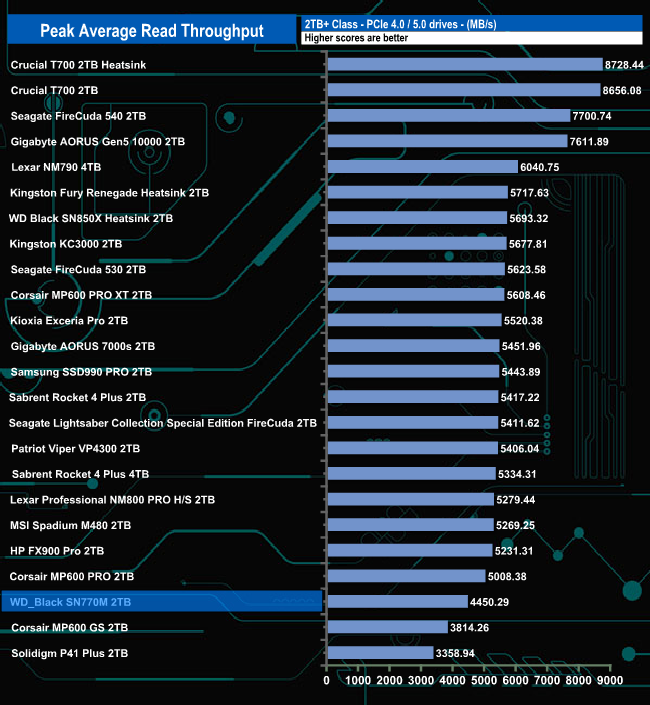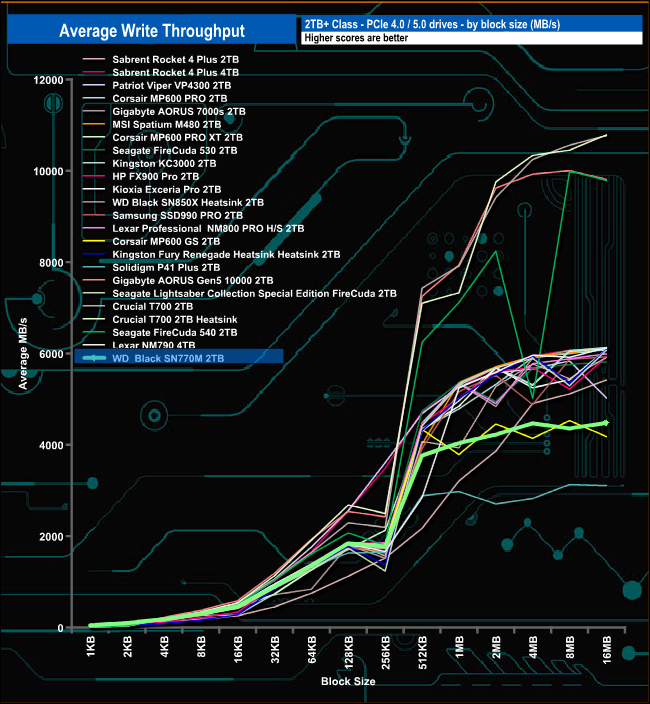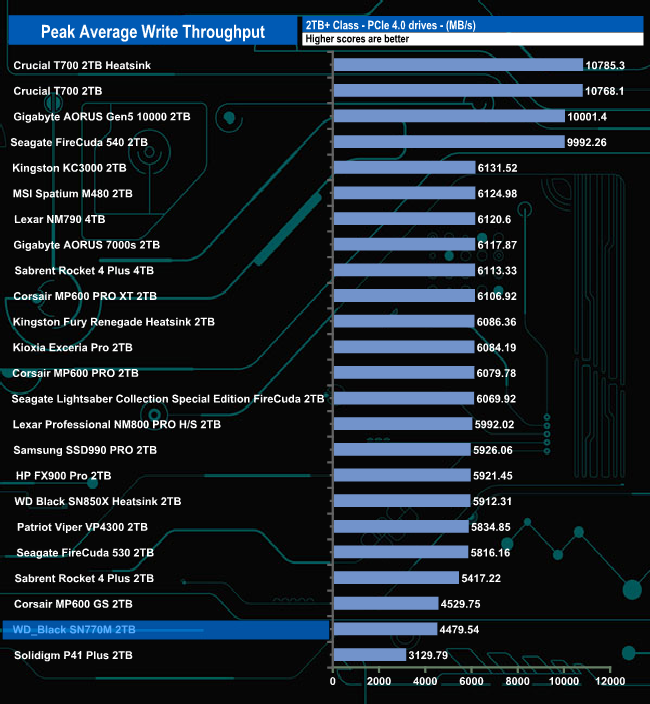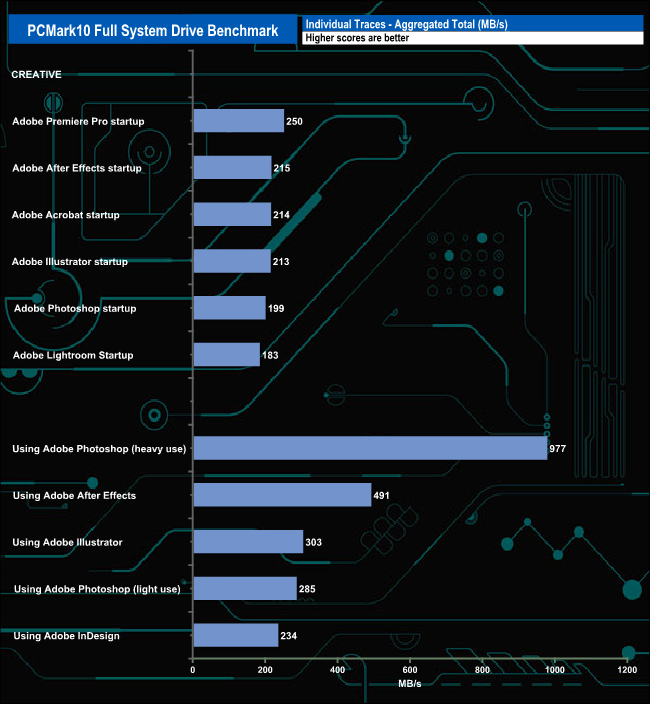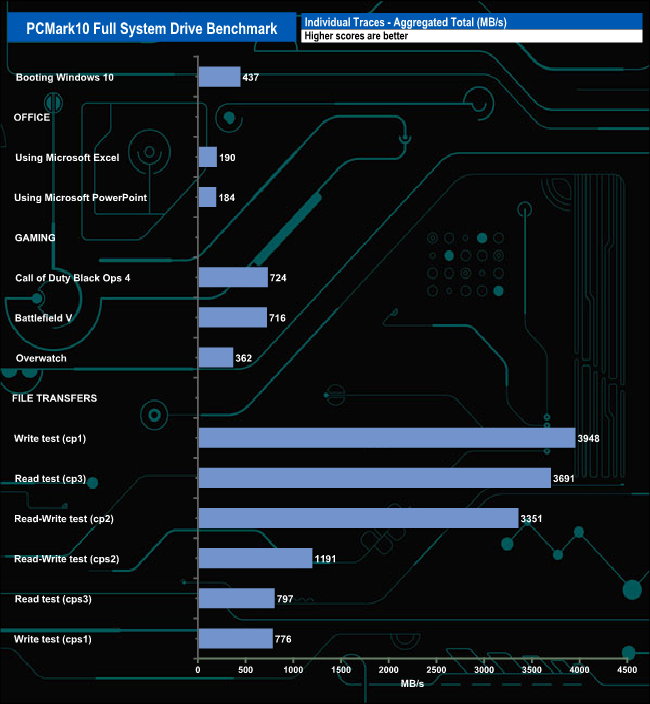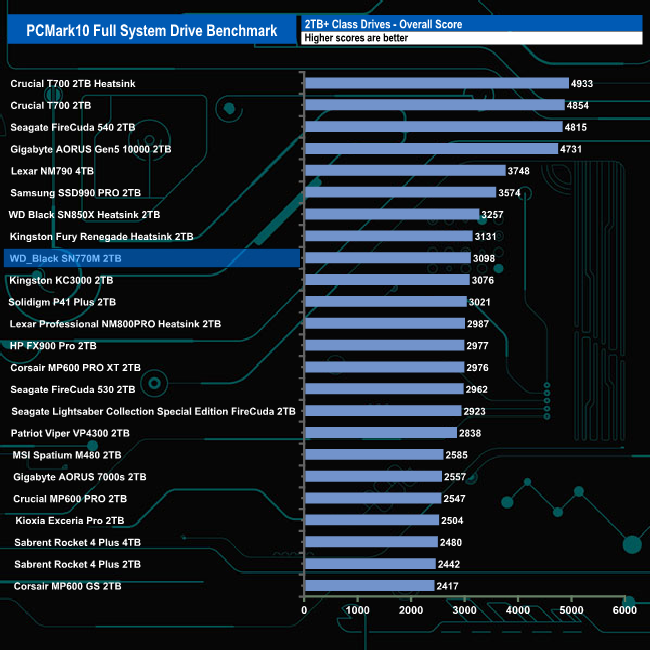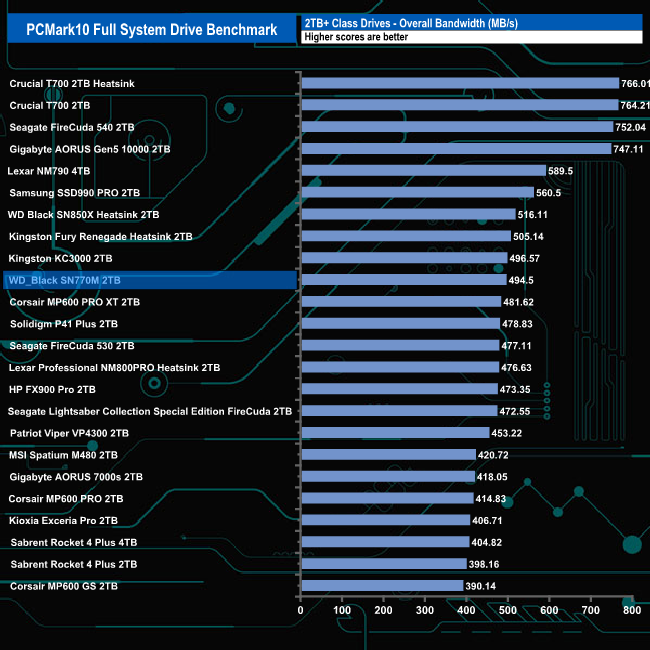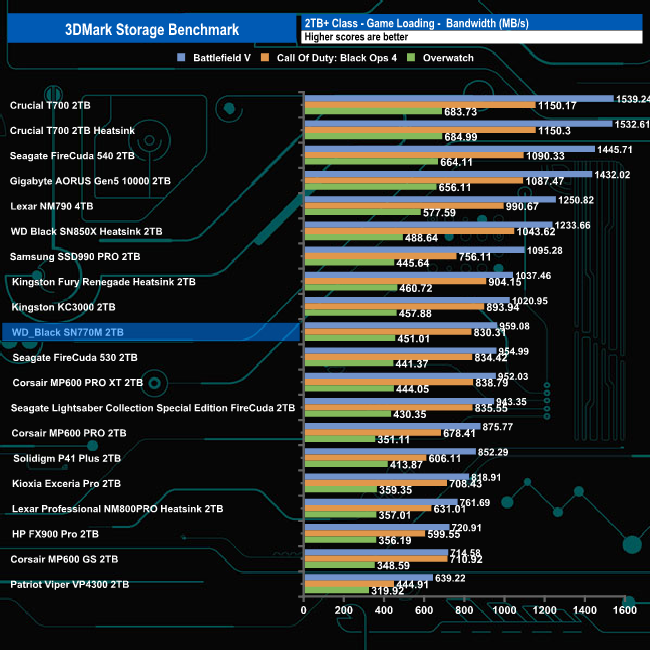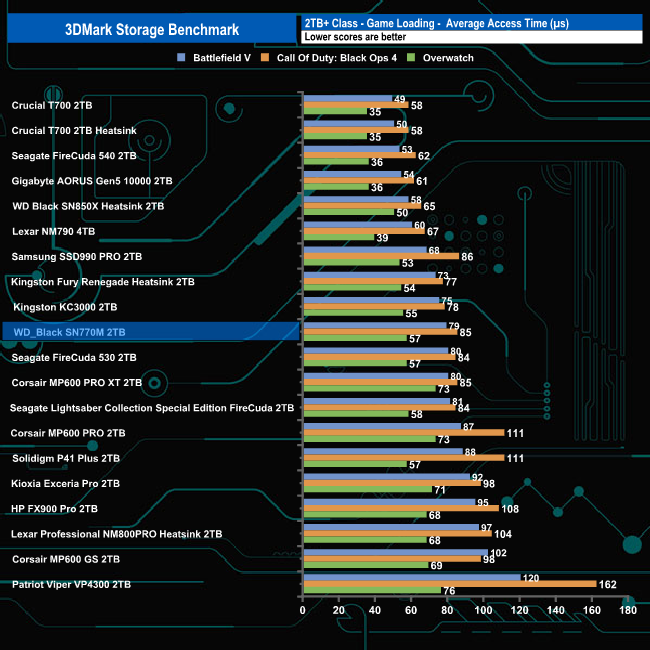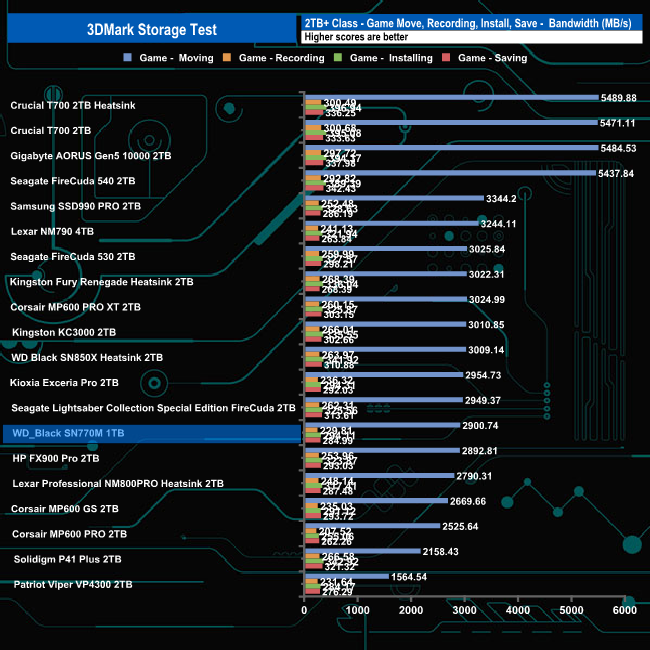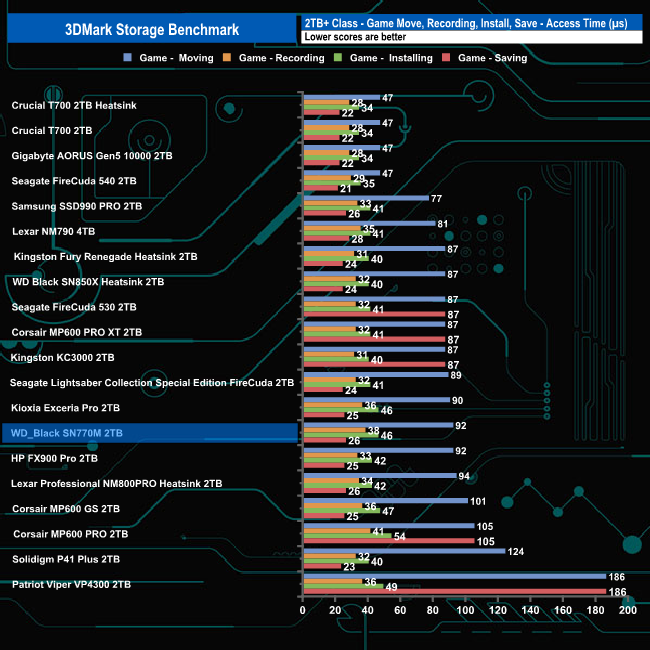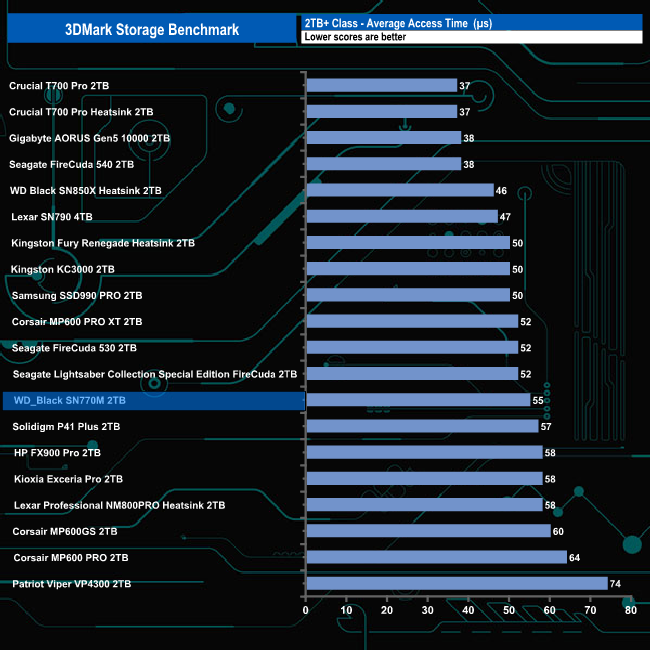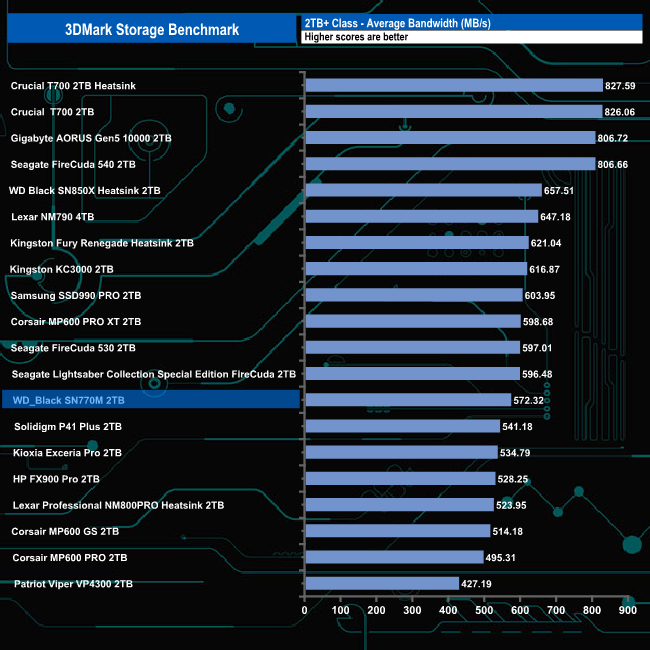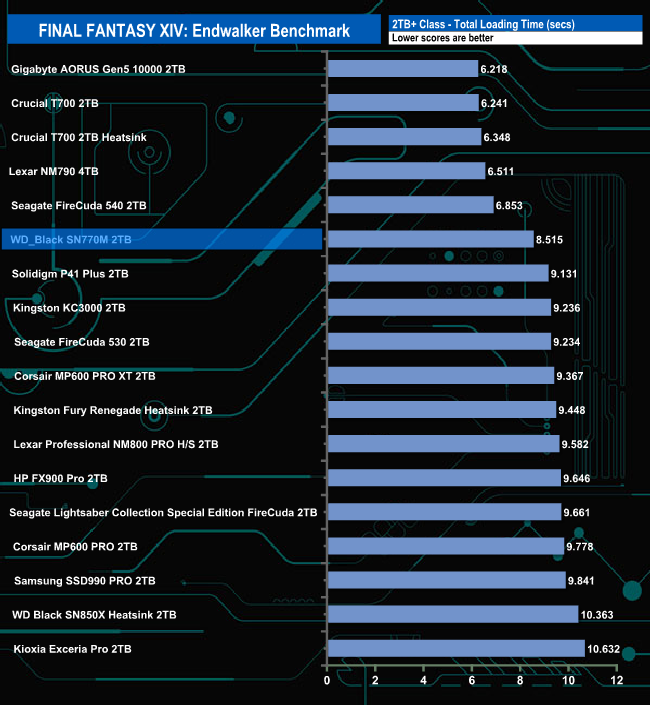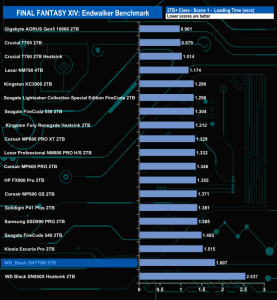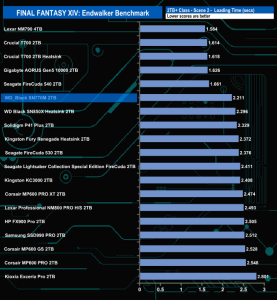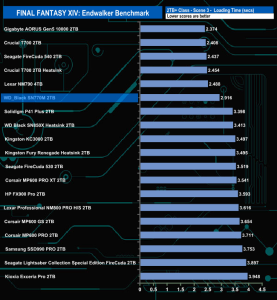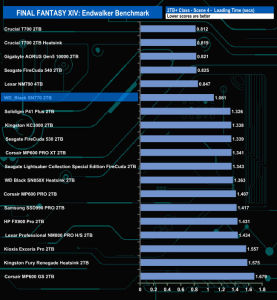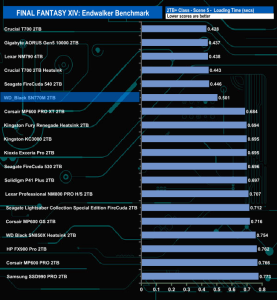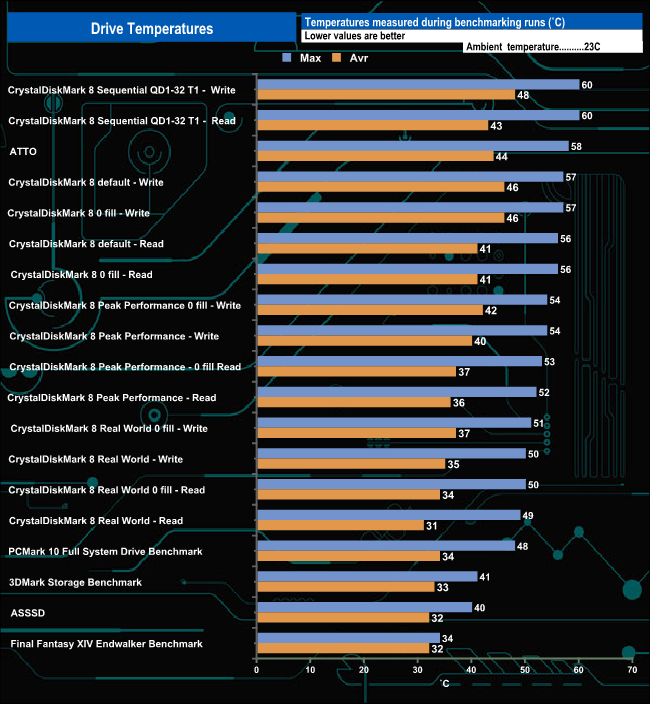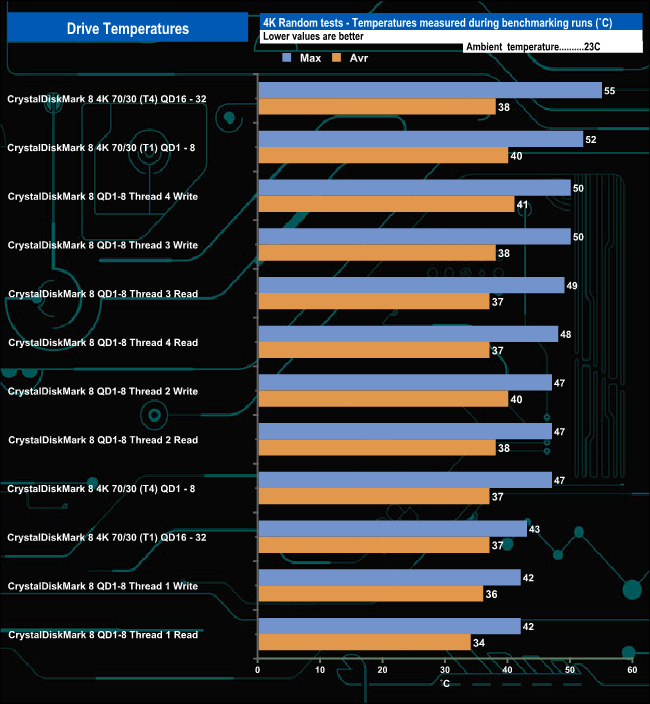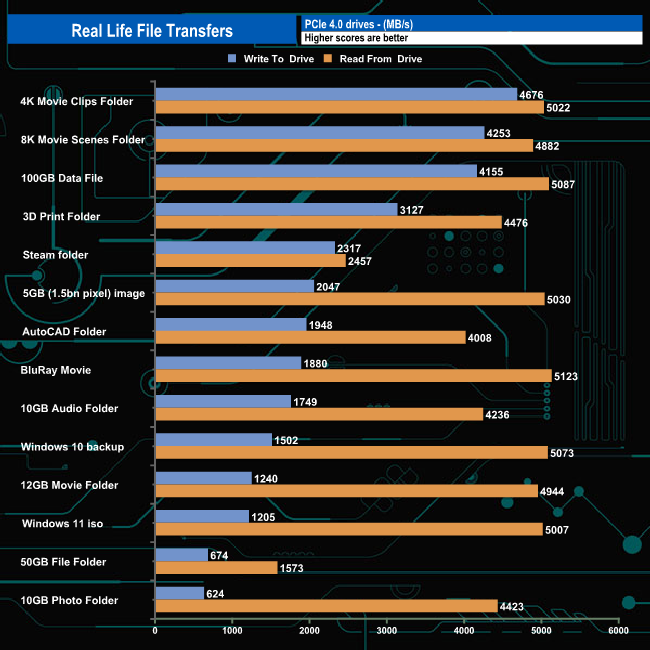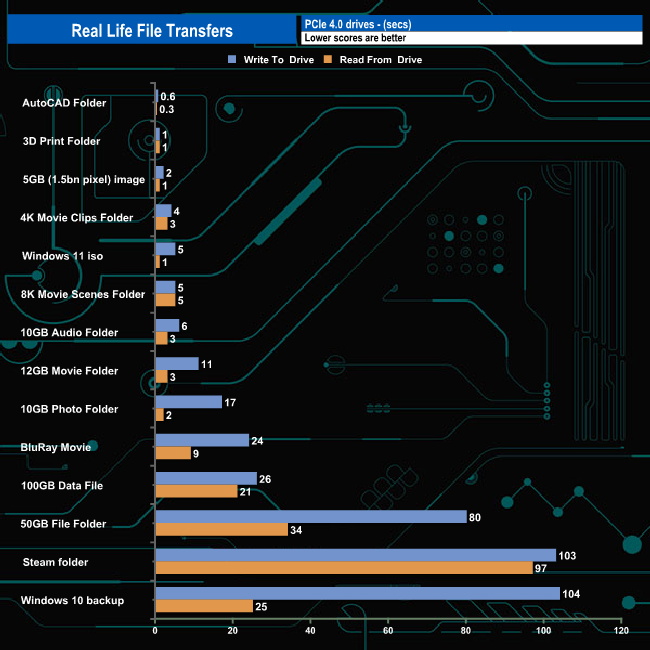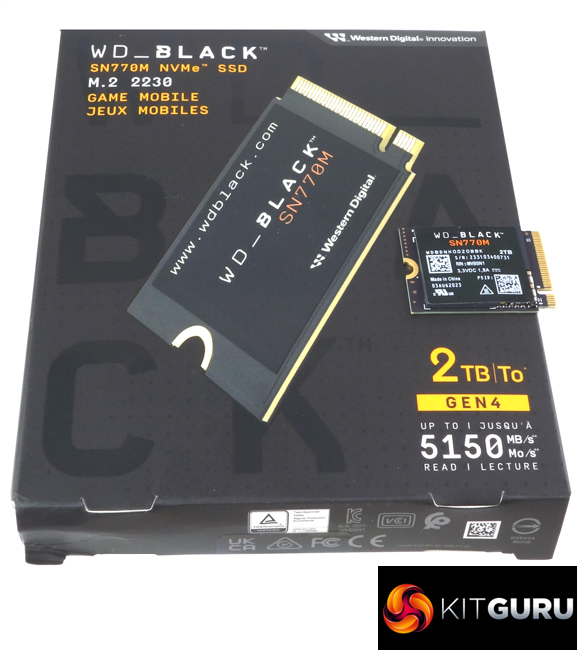
As the handheld gaming PC market grows, there is an ever-increasing demand for storage solutions to cope with the growing size of games. Enter WD with a new addition to their performance Black product line, the WD_Black SN770M, an M.2 2230 Gen 4 NVMe SSD – could this be the perfect upgrade for your Steam Deck?
At launch, the WD_Black SN770M product line consists of three models, a 500GB entry drive, 1TB and the flagship 2TB model that WD kindly sent us to review. The drive uses a combination of an in-house WD 4-channel PCIe 4.0 controller and 112-layer BiCS5 TLC NAND. The SN770M is a DRAMless design using HMB (Host Memory Buffer) technology instead.
Sequential performance figures quoted by WD are up to 5,150MB/s and 4,850MB/s for read/writes respectively for the 2TB drive. The 1TB drive has the same read figure but with writes slightly faster at up to 4,900MB/s. The 500GB gets read/write ratings of up to 5,000MB/s and 4,000MB/s for read and writes respectively.
Random performance for the 2TB model is quoted as up to 650,000 IOPS for reads and up to 800,000 IOPS for writes. The 1TB and 500GB drives have the same write rating as the 2TB drive with the 500GB drive rated as up to 460,000 IOPS for random reads and the 1TB model, the fastest of the range, at up to 740,000 IOPS.
WD rates the endurance of the 2TB SN770M as 1,200TBW. The 1TB drive is rated at 600TBW and the 500GB, 300TBW. WD back the range with a 5-year warranty.
Physical Specifications:
- Usable Capacities: 2TB.
- NAND Components: 112-layer BiCS5 TLC NAND.
- NAND Controller: WD 4-channel.
- Cache: none, (HMB/host memory buffer).
- Interface: PCIe Gen 4 x4.
- Form Factor: M.2 2230.
- Dimensions: 30 x 22 x 2.38mm.
- Drive Weight: 2.8g.
Firmware Version: 731100WD.
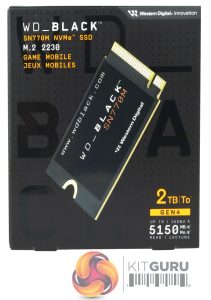
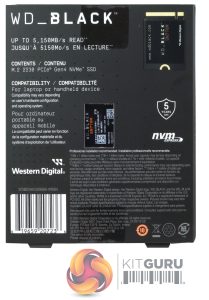
The WD _Black SN770M comes in a smallish box with a clear image of the drive on the front. Under the image is the drive's capacity, the fact it's a Gen4 drive and the Sequential read performance figure (up to 5,150MB/s). The rear of the box has a small image of the drive on the right-hand side while on the left is a dual language (English/French) speed rating (Sequential Read), box contents and compatibility. In the centre of the box is a clear plastic panel through which part of the drive is visible, sitting in its protective plastic enclosure, next to which is a logo displaying the fact that the drive has a five-year warranty. The only other thing in the box is a Technical Support and Warranty Guide.
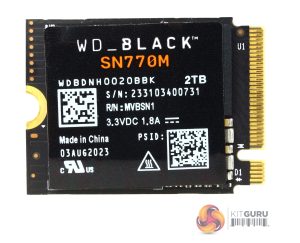
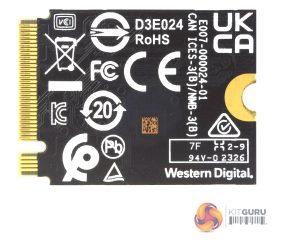
The 2TB Black SN770M is built on a single-sided M.2 2230 format.
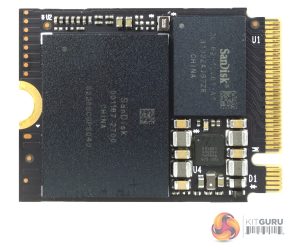
The single 2TB SanDisk BiCS5 112-layer TLC NAND package (coded 001872T00) takes up most of the space on the small PCB with just enough space left for the 4-channel in-house controller (coded 20-82-10081-A1) and a few power chips.
WD’s SSD management utility goes under the name of SSD Dashboard. With it, you can monitor drive status and performance, update firmware and monitor temperatures. There’s no cloning tool integrated into the utility but you can download Acronis True Image WD Edition from the WD website.
To test the WD_Black SN770M in one of our test rigs we used a Sabrent (EC-PCIE) NVMe M.2 SSD to PCIe x16/x8/x4 card – a useful, reasonably priced little adapter if you have run out of M.2 PCIe x4 slots on a motherboard as it supports 2230 / 2242 / 2260 and 2280 format drives. For more details check the Sabrent website.
For testing, the drives are all wiped and reset to factory settings by HDDerase V4. We try to use free or easily available programs and some real-world testing so you can compare our findings against your own system.
This is a good way to measure potential upgrade benefits.
Main system:
AMD Ryzen 7 7700X, 32GB DDR5-6000, Nvidia GeForce RTX 3050 and a Gigabyte AORUS X670E Xtreme motherboard.
Other drives:
PCIe Gen5 2TB+
Crucial T700 2TB
Crucial T700 with Heatsink 2TB
Gigabyte AORUS 10000 2TB
Seagate FireCuda 520 2TB
PCIe Gen4 2TB+
Corsair MP600 GS 2TB
Corsair MP600 PRO 2TB
Corsair MP600 PRO XT 2TB
Gigabyte AORUS 7000e 2TB
HP FX900 Pro 2TB
Kingston Fury Renegade Heatsink 2TB
Kingston KC3000 2TB
Kioxia Exceria Pro 2TB
Lexar Professional NM800PRO Heatsink 2TB
MSI Spatium M480 2TB
Patriot Viper VP4300 2TB
Sabrent Rocket 4 Plus 2TB
Sabrent Rocket 4 Plus 4TB
Samsung SSD990 PRO 2TB
Solidigm P41 Plus 2TB
Seagate Lightsaber Collection Special Edition FireCuda 2TB
Seagate FireCuda 530 2TB
WD Black SN850X Heatsink 2TB
Software:
Atto Disk Benchmark 4.
CrystalMark 8.0.0.
AS SSD 2.0.
IOMeter.
UL Solutions PC Mark 10.
UL Solutions 3DMark Storage Benchmark.
Final Fantasy XIV Endwalker Official Benchmark.
All our results were achieved by running each test five times with every configuration this ensures that any glitches are removed from the results. Trim is confirmed as running by typing fsutil behavior query disabledeletenotify into the command line. A response of disabledeletenotify =0 confirms TRIM is active.
CrystalDiskMark is a useful benchmark to measure the theoretical performance levels of hard drives and SSDs. We are using v8.0.
Although its read score of 69.21MB/s sees the drive at the bottom of the CrystalDiskMark 8 4K T1 QD1 test results chart, its write score of 266.92MB/s is one of the better ones we've seen for a Gen 4 drive.
As you can see from the benchmark results screen we can confirm the official maximum Sequential read/write speeds (5,150MB/s and 4,850MB/s respectively) with a read test result of 5,207.77MB/s and 4,904.94MB/s for writes.
Those Sequential read/write result figures of 5,207.77MB/s and 4,904.94MB respectively puts the WD_Black SN770M firmly in the lower half of the results table.
Peak Performance Profile
Switching over to CrystalDiskMark 8's Peak Performance profile we could once again confirm the official Sequential ratings for the drive.
Using the Peak Performance profile we could confirm the official 4K random performance figures for the drive of up to 650,000 IOPS for reads and up to 800,000 IOPS for writes with test results of 651,606 IOPS for reads and 827,504 IOPS for writes.
Real World Profile
The WD_Black 770M performs well in the Real World profile test. With Sequential read/write scores of 4,660MB/s and 4,840MB/s respectively the drive slips into the top 10 of Gen 4 drives tested with this benchmark.
The ATTO Disk Benchmark performance measurement tool is compatible with Microsoft Windows. Measure your storage system performance with various transfer sizes and test lengths for reads and writes. Several options are available to customize your performance measurement including queue depth, overlapped I/O and even a comparison mode with the option to run continuously. Use ATTO Disk Benchmark to test any manufacturer's RAID controllers, storage controllers, host adapters, hard drives and SSD drives and notice that ATTO products will consistently provide the highest level of performance to your storage.
We are using version 4.0 for our NVMe disk tests.
WD rates the Sequential performance of the drive as up to 5,150MB/s and 4,850MB/s for read/writes respectively. With the ATTO benchmark, we couldn't quite hit the official maximums with test results of 4,830MB/s for reads and 4,520MB/s for writes.
The 2TB WD_Black SN770M's read performance starts to level off at the 256KB mark at 4,840MB/s and continues in the same manner till the end of the test. Write performance starts levelling off at 128KB (4,510MB/s) and carries on at more or less the same speed until the 8MB mark when it dips to 4,370MB/s. Incidentally, although the graph doesn't show it after the 8MB mark the drive recovers back up to 4,520MB/s and carries on around this speed until the end of the test run at 64MB I/O.
AS SSD is a great free tool designed just for benching Solid State Drives. It performs an array of sequential read-and-write tests, as well as random read-and-write tests with sequential access times over a portion of the drive. It uses incompressible data samples which many drives struggle with, so results can be viewed as the worst-case scenarios.
AS SSD includes a sub suite of benchmarks with various file pattern algorithms but this is difficult in trying to judge accurate performance figures.
Using the AS SSD benchmark the drive's read score of 2527 sees it near the bottom of the results chart. However, its write score of 3783 is the fifth best we've seen from a consumer Gen 4 drive to date.
We used CrystalDiskMark 8‘s custom settings to test the Sequential read and write performance of the drive through a range of queue depths. The setup for the tests is listed below.
128KB Sequential Read / Write.
Transfer Request Size: 128KB, Thread(s): 1, Outstanding I/O: 1-32.
With this Sequential performance test, we can confirm the official Sequential ratings of 5,150MB/s and 4,850MB/s for read/writes respectively with peak test results of 5,233.97MB/s for reads and 4,891.6MB/s for writes. There is a large drop-off in the read performance at QD8 but the drive recovers quickly to finish the run at 5,233.97MB/s. Writes peak at QD4 and slowly drop away, finishing the test run (QD32) at 4,846.87MB/s.
128KB Sequential Read v QD compared
The drive sits in the top half of the Sequential read results table at QDs 1, 2 and 4 but by the end of the test run, it has fallen to near the bottom of the chart.
128KB Sequential Write v QD compared.
When it comes to the Sequential writes result tables, the drive doesn't get out of the bottom half of the table for the whole of the test run.
We used CrystalDiskMark 8‘s custom settings to test the 4K random read performance of the drive through a range of queue depths. The setup for the tests is listed below.
Transfer Request Size: 4KB, Outstanding I/O: 1-32.
The 2TB WD_Black SN770M is officially rated as up to 650,000 IOPS for random reads. Using our 4-threaded random read test we couldn't quite get to the official maximum as the best we saw was 591.267 IOPS (QD32).
4K Sustained Random Read v QD.
At QDs 1, 2 and 4 the drive languishes at the bottom of the results chart but at QD32 it rockets up to near the top of the table.
We used CrystalDiskMark 8‘s custom settings to test the 4K random write performance of the drive through a range of queue depths. The setup for the tests is listed below.
Transfer Request Size: 4KB, Outstanding I/O: 1-32.
Officially the WD_Black SN770M is rated at up to 800,000 IOPS for 4K random writes. Using our 4-threaded tests we fell a long way short of this mark, the best we saw was 564,908 IOPS (QD32).
4K Sustained Random Write v QD.
Even though our test result is a long way off the official figure it is still good enough to put the drive in the top 10 of Gen 4 drives we've tested to date and at QD32, it's the fastest drive we've seen to date.
We used CrystalDiskMark 8’s custom settings to test the 4K 70/30 mixed read/write performance of the drive through a range of queue depths.
The WD_Black SN770M has no problem dealing with our 70/30 read/write tests either using a single thread or with four threads. With a single thread, the drive produces 19,508.9 IOPS (79.908MB/s) at QD1 climbing to finish the test run at QD32 with 215,639 IOPS (883.257MB/s). Using four threads the drive climbs from 78,356.5 IOPS (320.948MB/s) at QD1 to 549,147 IOPS (2,249.31MB/s) at QD32.
We used CrystalDiskMark 8 to test the random performance of the drive at lower queue depths (QD1 – QD8 where most of the everyday workloads occur) using 1 to 4 threads.
Random Reads
At QD1 the read performance of the 1TB WD_Black SN770M ranges from a low point of 17,020.9 IOPS (69.71MB/s) using a single thread up to 60,724.4 IOPS (248.72MB/s) using four threads. The performance increases steadily as the queue depth deepens for each thread count finishing at QD8 with figures ranging from 102,283 IOPS (418.95MB/s) for a single thread up to 284,192 IOPS (1,164.05MB/s) for four threads.
Random Writes
The WD Black SN770M's write performance climbs smoothly throughout the tested queue depths and threads with a peak performance figure of 542,506 IOPS (2,222MB/s) at QD8 using four threads.
In our read-throughput test, the 2TB Black SN770M peaked at 4,450.29MB/s at the end of the test run at the 16MB block mark. That test result is some way off the official maximum of 5,150MB/s.
The peak read throughput test result of 4,450.29MB/s for the Black SN770M sees it in the bottom half of our results chart.
Peak write throughput came at the 16MB block mark at 4,479MB/s, again slower than the official maximum figure of 4,850MB/s.
As with the read throughput test, the write test result sees the drive in the bottom half of the table.
The PCMark 10 Full System Drive Benchmark uses a wide-ranging set of real-world traces from popular applications and common tasks to fully test the performance of the fastest modern drives. The benchmark is designed to measure the performance of fast system drives using the SATA bus at the low end and devices connected via PCI Express at the high end.
The goal of the benchmark is to show meaningful real-world performance differences between fast storage technologies such as SATA, NVMe, and Intel’s Optane. The Full System Drive Benchmark uses 23 traces, running 3 passes with each trace. It typically takes an hour to run.
Traces used:
Booting Windows 10.
Adobe Acrobat – starting the application until usable.
Adobe Illustrator – starting the application until usable Adobe Premiere Pro – starting the application until usable.
Adobe Photoshop – starting the application until usable.
Battlefield V – starting the game until the main menu.
Call of Duty Black Ops 4 – starting the game until the main menu.
Overwatch – starting the game until main menu.
Using Adobe After Effects.
Using Microsoft Excel.
Using Adobe Illustrator.
Using Adobe InDesign.
Using Microsoft PowerPoint.
Using Adobe Photoshop (heavy use).
Using Adobe Photoshop (light use).
cp1 Copying 4 ISO image files, 20 GB in total, from a secondary drive to the target drive (write test).
cp2 Making a copy of the ISO files (read-write test).
cp3 Copying the ISO to a secondary drive (read test).
cps1Copying 339 JPEG files, 2.37 GB in total, to the target drive (write test).
cps2 Making a copy of the JPEG files (read-write test).
cps3 Copying the JPEG files to another drive (read test).
The WD_Black SN770M dealt with the rigours of the PCMark10’s Full System Drive pretty well. The drive averaged 212MB/s for the six Adobe startup traces, the fastest being the 250GB/s for the Adobe Premiere Pro startup. The drive averaged 458MB/s for the five Adobe usage traces, the fastest of which was the Heavy Use Adobe Photoshop trace at 977MB/s.
For the three gaming tests, the drive averaged 600MB/s with the fastest being the Call Of Duty Black Ops 4 trace at 724MB/s. The file transfer tests also produced a good cp1 (write test) figure of 3,948MB/s backed up by 3,691MB/s for the cp3 (read test) and 3,351MB/s for the cp2 read/write test traces.
The overall bandwidth figure of 494.5MB/s sees the WD_ Black SN770M sitting in a mid-table position.
The 3DMark Storage Benchmark uses traces recorded from popular games and gaming-related activities to measure real-world gaming performance.
Traces used –
Battlefield V
Loading Battlefield™ V from launch to the main menu.
Call of Duty Black Ops 4
Loading Call of Duty®: Black Ops 4 from launch to the main menu.
Overwatch
Loading Overwatch® from launch to the main menu.
Game Move
Copying the Steam folder for Counter-Strike®: Global Offensive from an external SSD to the system drive.
Game Recording
Recording a 1080p gameplay video at 60 FPS with OBS (Open Broadcaster Software) while playing Overwatch®.
Installing Game
Installing The Outer Worlds® from the Epic Games Launcher.
Game Saving
Saving progress in The Outer Worlds game.
In 3DMark's Storage Benchmark Game Loading test, the Black SN770M averaged 746.8MB/s for the three game loading tests with an average time of 73 µs.
In the game moving, recording, installing and saving test traces the drive averaged 934.85MB/s with an average access time of 50.5µs for the four tests.
The average bandwidth figure for the drive was 572.32MB/s, a score that sees the WD_Black SN770M in the bottom half of the table.
The Final Fantasy XIV Endwalker Official Benchmark uses actual maps and playable characters to assign a score to your PC and rate its performance including scene loading times.
The benchmark gives an overall load time as well as loading times by scene.
WD's Black SN770M does well enough in the Final Fantasy XIV Endwalker Official Benchmark. It doesn't top any of the scene load times, indeed for scene 1 it's very nearly the slowest drive, but it still manages to end up in the top 10 drives we tested with this benchmark.
We took note of the drive’s temperature during some of our benchmarking runs.
Because of the WD_Black SN770M's small format, we had to use an adapter to test the drive in our normal test rig. The Sabrent EC-PCIE comes with an aluminium heatsink and thermal padding to help keep any drive inside cool. The hottest the drive got was when it was being pushed very hard during the Sequential write test using CrystalDiskMark8, when it peaked at 60° C which is 25° C under the maximum operating temperature. For the non-4 K tests the drive averaged 51°C while for the 4K-based tests, the average was 47.6°C.
To test real life performance of a drive we use a mix of folder/file types and by using the FastCopy utility (which gives a time as well as MB/s result) we record the performance of drive reading from & writing to a 2TB Seagate FireCuda 510.
Transfer Details
Windows 10 backup – 118GB.
Data file – 100GB.
BluRay Movie – 42GB.
Windows 11 iso – 5.4GB.
File folder – 50GB – 28,523 files.
Steam folder – 222GB (8 games: Alien Isolation, Battlefield 4, BioShock Infinite, Crysis 3, Grand Theft Auto V, Shadow Of Mordor, Skyrim, The Witcher3 Wild Hunt).
Movie demos 8K – 21GB – (11 demos).
Raw Movie Clips 4K – 16GB – (9 MP4V files).
Movie folder – 12GB – 15 files – (8 @ .MKV, 4 @ .MOV, 3 @ MP4).
Photo Folder – 10GB – 304 files – (171 @ .RAW, 105 @ JPG, 21 @ .CR2, 5 @ .DNG).
Audio Folder – 10GB – 1,483 files – (1479 @ MP3, 4 @ .FLAC files).
Single large image – 5GB – 1.5bn pixel photo.
3D Printer File Folder – 4.25GB – (166 files – 105 @ .STL, 38 @ .FBX, 11 @ .blend, 5 @ .lwo, 4 @ .OBJ, 3@ .3ds).
AutoCAD File Folder – 1.5GB (80 files – 60 @ .DWG and 20 @.DXF).
The drive averaged 2,241MB/s when writing the 14 transfer tests, with the fastest being the 4K Movie Clips folder transfer at 4,676MB/s with the 10GB Photo folder the slowest at 624MB/s. Reading back the data the drive averaged 4,381MB/s, the faster transfer being the BluRay movie at 5,123MB/s. This time the slowest transfer was the 50GB file folder at 1,537MB/s.
A recent Gartner report stated that the handheld gaming console market is expected to reach 14.8M by 2027. This figure, combined with the growth in AAA (high-budget, high-profile) games means that the demand for storage capacity for handheld gaming PCs is set to soar ever upward. One company offering a product to try and fill this demand is WD with the latest addition to their high-performance Black product line, the SN770M.
The WD_Black SN770M is an M.2 2230, Gen 4 drive available in three capacities, 500GB, 1TB, and 2TB (the drive we are reviewing here). At the heart of the drive is an in-house WD 4-channel PCIe 4.0 controller which looks after a package of 112-layer BiCS5 TLC NAND.
Official Sequential ratings for the 2TB SN770M drive are up to 5,150MB/s for reads with writes at up to 4,850MB/s. When benchmarked with the ATTO benchmark we couldn’t quite hit the official maximums, the drive producing a read figure of 4,830MB/s with writes at 4,520MB/s. However, with CrystalDiskMark 8 we could confirm both figures with best test results of 5,207.77MB/s for reads and 4,904.94MB/s for writes.
When it comes to 4K random performance, WD quotes figures of up to 650,000 IOPS and up to 800,000 IOPS for reads and writes respectively. With our standard 4-threaded tests we saw a best of 591.267 IOPS (QD32) for reads and 564,908 IOPS for writes also at QD32. However, using the Peak Performance profile in CrystalDiskMark 8 we could confirm those official figures with test results of 651,606 IOPS for reads and 827,504 IOPS for writes.
In terms of endurance, the 2TB SN770M is rated at 1200TBW with the 1TB drive at 600TBW and the 500GB drive at 300TBW. WD backs the drive range with a 5-year warranty.
We found the 2TB WD_Black SN770M on WD's website for £179.99 (inc VAT) HERE.
Discuss on our Facebook page HERE.
Pros
- Overall performance.
- 5-year warranty.
Cons
- Couldn’t match the official maximum 4K random write figures in some of our testing.
KitGuru says: The WD_Black SN770M is the company's first crack at the growing M.2 2230 market segment, offering performance and large capacity in a small package.
 KitGuru KitGuru.net – Tech News | Hardware News | Hardware Reviews | IOS | Mobile | Gaming | Graphics Cards
KitGuru KitGuru.net – Tech News | Hardware News | Hardware Reviews | IOS | Mobile | Gaming | Graphics Cards


